Torah portions
- Matot (Audio Portion)
Matot means “the tribes,” but also has very interesting secondary meanings of “staff, scepter, rod, branch,” all of which seem relevant here. The portion opens with a discussion on the need to fulfill valid oaths to Abba YHWH to the letter-valid meaning that the oath is not contradictory to Abba YHWH’s laws or pronouncements. Various examples and applications of this principle follow. Then it is time to actually go to war against Midian. It is interesting that the previous portion had Israel get ready for this mentally, by totally changing their attitude and then Abba YHWH says, “Now is the …
- Pinchus (Audio Portion)
Pinchas refers to the man whose righteous example of purging evil from Israel’s ranks moved Abba YHWH to stop a plague that would have otherwise destroyed all Israel. More than that, the portion starts with Pinchas getting a particularly high honor from Abba YHWH, the covenant of peace that rests on him alone and ensures his progeny the high priesthood. But with the population of Israel decimated by the plague, a new census had to be done in chapter 26. When that counting was concluded, Moshe is then given a very interesting issue to deliberate on: Should women be allowed …
- Balak (Audio Portion)
Balak refers to the man, Balak of Zippor, who was the king of Moab and a resolute enemy of Israel. When Balak then hears of a man named Balaam who can predict the future and cast curses, he hires him to curse Israel. However, Balaam can truly hear Abba YHWH’s Will and Abba YHWH tells him plainly that he can’t curse Israel. On three occasions the king of Moab wants a curse against Israel but only gets blessings for them instead. And then Balaam gives a fourth blessing on his way out—one for the proverbial road as it were. Ironically …
- Chukkat (Audio Portion)
“Chukkat” means “statute” and the portion opens with the requirements of the famous red heifer, that perfect red young cow that is so sacred, nothing else will do to inaugurate the entire sacrificial infrastructure. Not surprisingly then, the requirements for finding and then preparing for such a massively important sacrifice are detailed and intricate. Other purity laws follow after which we are confronted with the sad news of Moshe’s sister Miriam dying. Ironically, instead of Moshe getting compassion from the Israelites on this occasion they immediately rise up in rebellion against him once more! In response to this latest threat, …
- Korach (Audio Portion)
“Korach” refers to the man of the same name who mounted a rebellion against Moshe. There are many unique aspects to this act of rebellion, such as it being led by a Levite and a confederation of other leaders, and that Moshe and Aaron are on the same side against them. We also have touches of foreshadowing of Eliyahu’s later contest against the prophets of Baal. The results are among the most graphic of disasters depicted in Tanakh. Because the very fabric of the priesthood was threatened, the stakes for the right side surviving were incredibly high, and when order …
- Shelach Lecha (Audio Portion)
“Shelach Lecha” means “send out for yourself,” referring to the spies that Moshe will send into Canaan to do a little “reconnaissance” on the strategic strengths of the various peoples living in Canaan. When the spies let their fear get the better of them and bring back an evil report, Abba YHWH officially enacts punishment that they will spend an additional 40 years wandering in the wilderness, or a total of 42 years from the time they left Egypt. However Caleb and Joshua prove themselves to be the voices of righteousness and will not give into fear.
Then, for the second … - Behalotekha (Audio Portion)
“BeHalotekha” means “when you elevate” as in “when you lift up the lamps.” Aaron is commanded to light the lamps of the menorah and the tribe of Levi is commanded to serve the sanctuary. This is also when the institution of the 2nd Pesach is established and when the Israelites grumble over only having manna to eat as well as showing rebellion against Moshe from his own siblings!
- Naso (Audio Portion)
“Naso” means “take,” as in “you will take an accounting of Israel” or a census. This portion begins with the census on the Gershonites and details all their prescribed duties in ministering to the Tabernacle. This is followed by the bitter waters test for an adulterous woman in Numbers 5 and other instructions for the sons of Aaron, culminating with the Blessing of the Priests in chapter 6. The 7th and last chapter in the portion details the contributions for the Tabernacle made by each tribal leader.
- Bamidbar (Audio Portion)
“BaMidbar” means “in the wilderness” and it begins with a census being taken of the nation, particularly of men older than 20 years who can serve in combat. The total comes to 603,550 except Levites who cannot be counted for this purpose. After this more details are given for how the Levites are to maintain the Tabernacle and their own purity.
- Be’Chukkotai (Audio Portion)
“BeChukkotai” means “by/through My statutes,” referring to Abba YHWH’s judgments being “walked in” or followed. There is a distinction made between “laws” and “statutes” and “commandments” which we will look into later. This portion though goes beyond just listing a bunch of rules; it deals with the rewards for obedience and punishments for disobedience. Most striking of these enactments is the prediction in 26:34-35, where Israel is warned they will be vomited out of the land if they fail to keep the Land Sabbath. The 27th chapter has extensive details on the monetary values of making an oath of consecration …
- Bahar (Audio Portion)
“BaHar” means at the mountain, from which Abba YHWH gives this series of instructions. It concerns itself with the intricate Jubilee and Land Sabbath rules, which I will be discussing from Torah and giving my take on them in the Eternal Torah Calendar system.
- Emor (Audio Portion)
“Emor” means “he said” and it is heavily concerned with purity regulations, but it then shifts into a bigger picture with restoring and re stating the sacred year. Abba YHWH does this to show the Israelites to know they renew their covenant by following His instructions, so He repeats these rules to reassure Israel their covenant continues.
- Kedoshim (Audio Portion)
“Kedoshim” means “you shall be Set-Apart.” This is a kind of “Cliff Notes” style discussion of some of the main themes of the overall Torah. It includes some of the Ten Words (Commandments) but not all of them and wraps around the ones it does include with either brief application advice or other commands that the text didn’t have the chance to get to yet. Also stay tuned for the “deep dives” of Video #4, first with the timing of Passion Week and a very rare astronomical event and next with the stunning vision that is the 153 Code!
- Aharei Mot (Audio Portion)
“Aharei Mot” means “after the death,” referring to the demise of Aaron’s sons Nadab and Abihu who offered fire in a way not sanctioned by Abba YHWH. The portion begins with the purification measures that Aaron and his remaining sons need to go through to rectify the evil that was done in Abba YHWH’s sight. Once done, additional purity regulations are given on how native Israelites are to slaughter and handle blood. Abba YHWH then opens the last chapter in this portion by reminding Israel that they are not to do the practices of the peoples either from where they …
- Metzora (Audio Portion)
“Metzora” or more precisely “Ha Metzora” means “The Leper,” and the portion concerns primarily how a leper gets pronounced clean by the priests, how he demonstrates he has been cleansed from the disease. The previous Torah portion (Tazria) concerned states of impurity and isolation for women who have just given birth and lepers. This portion deals with how to get the lepers clean again. It then takes an interesting turn to discuss what happens when a whole house becomes unclean before ending with other purity rules for men and women.
- Shemini (Audio Portion)
Shemini means “on the 8th day” deals with the end of the priests’ consecration period. After this, they can then make expiation for all of Israel. Unfortunately however, two of Aaron’s sons pay the ultimate price for not ministering properly to the people. The portion then ends with the “kosher list” of what can and cannot be eaten, a perfect segue into our Apostolic Writings reading which also discusses kosher food.
- Tzav (Audio Portion)
Tzav means “command” as in commanding the sons of Aaron. It is another form of the same root we saw in an earlier parsha “tetzaveh” or “you will command/charge”. This time the focus of the portion is on the priestly responsibilities in preparing sacrifices.
- Vayikra (Audio Portion)
“Vayikra” means “and he called” and seems focused on the details about the various offerings and sacrifices that are needed for and by the priests of Aaron. I say “seems focused” because there are a lot of deep spiritual realities laying beneath the surface when we delve into the meanings of these rituals.
- Pekudei (Audio Portion)
“Pekudei” means “these are the records/expenses” and the portion opens with giving the pricing values for the materials that will be used in the Tabernacle. Many exacting physical (and spiritual) details are given for all the wondrous objects and the Tabernacle. But after all these long lists (from this portion and the previous ones) we finally get to the “payoff” in lovely chapter 40. It is in chapter 40—the last of Exodus—that time begins again as the priests begin their official service for Israel.
- Vayakhel (Audio Portion)
“Vayakhel” means “and he assembled.” The verb is derived from KAHAL, Hebrew for “assembly, congregation.” After a brief sermon on the importance of Shabbat, Moshe then gets the Israelites to work on the manifold details of building the Tabernacle and related furniture and objects.
- Ki Tissa (Audio Portion)
“Ki-Tissa” means “when you take,” referring to what Israel is to do when it takes a census of all the people. Most censuses in the ancient world are used for the purposes of taxation. This census is no different, except the “tax” is not for an emperor, but for YHWH’s Tabernacle. This “innocent” start though is misleading as it will then progress from those details to the construction of the Ark of the Covenant, only to culminate in disaster when Israel worships the golden calf. In a sense it parallels the pattern we saw with Yitro, except instead of preparation …
- Tetzaveh (Audio Portion)
“Tetzaveh” means “you will charge/command,” which opens with requirements for worship that are so important that failure to comply is simply not an option. If these needs are not met, nothing good will ever come about from that nation of Israel. We then get a lot of details about the designs of the priestly garments (ch. 28) and how the priests themselves are to be consecrated (ch. 29). The remaining 10 lines in ch. 30 concern instructions for building the altar.
- Terumah (Audio Portion)
Terumah means “the contributions” concerns a list of the offerings Israel gives to help build the Tabernacle in the wilderness as well as detailed instructions for building the Ark of the Covenant and other “divine furniture.”
- Mishpatim (Audio Portion)
“The Judgments” concerns a list of rules and regulations that Abba YHWH is giving to Israel. They involve practical examples from the root commands given at Sinai. However, there is much more going on here than a mere laundry list of obligations. Sandwiched between these rules are some of the most powerful insights that Abba YHWH has ever imparted to man. It’s as if we have to wade through the rules to get to the reward of these insights. Hey, that sounds a lot like life too!
- Yitro (Audio Portion)
It is very significant that this parsha is named “Jethro” and not “The Ten Words” or Commandments that it contains. In a sense the advice that Jethro gives Moshe is just as important as the Ten Commandments because it shows YHWH’s plan. First Moshe needs to keep himself from getting exhausted. Then he needs to set the leaders of the nation of Israel on the right course and encourage discussion between them and the people. And finally, the people need to understand that when Abba YHWH says “Don’t go there or you will die” that He is serious! Only then, …
- Be’shalach (Audio Portion)
“Be’shalach” means “let go,” and the portion begins with Pharaoh regretting his decision to free the Hebrews, so he musters his chariots in an attempt to bring them all back. Instead however Abba YHWH parts the waters of the Reed Sea and destroys Pharaoh’s army. But even as Israel rejoices, her trials are just beginning. After leaving camp from Elim on the 15th day (proving lunar sabbath wrong), the Israelites complain they don’t have enough meat, Abba YHWH sends a flock of quail and this is the first appearance of the mysterious Manna bread. The portion ends with a key …
- Bo (Audio Portion)
“Bo” means “go,” and that’s exactly what the Israelites do! After the last three plagues of locusts, darkness and killing the first born of Egypt do their damage, Pharaoh at last relents and lets Israel go. In the stunning aftermath of these events, the Pesach meal is instituted as an eternal memorial.
- Va’era (Audio Portion)
Va’Era means “and I appeared,” as in Abba YHWH explaining that He appeared to Abraham, Isaac and Jacob and this thought of course follows from His introduction in Shemot that Moshe is a descendant of these people, “I am the El of your fathers…” After the initial “Bricks Without Straw” setback which happened last week, Moshe is strengthened to go back to Pharaoh though neither he nor his own people seem willing to do the right thing. Now also the “warning period” is over and Abba YHWH prepares to begin the real battle. After the signs of the serpent and …
- Shemot (Audio Portion)
Shemot means “the names,” and it is almost impossible to do justice in a few lines to such a majestic portion. We begin with the set-up of “the Pharaoh who did not know Joseph” and who therefore enslaves the Israelites (probably Ahmose I). Despite an edict to kill all Hebrew male infants, Moshe escapes and is adopted by the Pharaoh’s daughter called “Bithia” by the rabbis, “Thermuthis” by Josephus or “Tarmuth” by the Talmud. Moshe is raised as a Prince of Egypt until he kills an overseer for beating a Hebrew slave. Then he flees to Midian and is given …
- Vayechi (Audio Portion)
Vayechi means “and he lived,” referring to the 17 years Ya’akov would spend in Egypt before dying. The portion begins with Jacob making final arrangements to be buried in Canaan once he dies. Ironically, the portion ends with Joseph making those same arrangements but deferring final relocation until the Exodus. It seems that Joseph’s final vision then was his foretelling the time of Moshe. In between these events, Joseph’s sons Ephraim and Manasseh are introduced to Jacob and in a very ironic twist Jacob does intentionally the same thing his father Isaac was deceived into doing by blessing the younger …
- Vayigash (Audio Portion)
Vayigash means “and he approached,” referring to Judah approaching Joseph and pleading with him to return Benjamin. After this plea Joseph reveals his true identity and begins reconciling with his brothers. The portion ends with Joseph sending his brothers to fetch Jacob into Egypt and setting up the main foundation pieces for what will become the Exodus.
Click this Link to Download the Notes! - Mikkets (Audio Portion)
Mikkets means “at the end” as in at the end of two years since Joseph interpreted the dreams of the baker and wine taster, and about three and half years for the total time of Joseph’s confinement. When Pharaoh has bad dreams and can’t get any of his seers to interpret them, the wine taster remembers Joseph and tells Pharaoh he can help. After Joseph correctly interprets the dream, he is quickly elevated to the second in command, given an Egyptian priestess for wife and moves forward with his plan for storing grain during the years of plenty. The rest …
- Vayeshev (Audio Portion)
Vayeshev means “and he dwelled.” This portion opens with the amazing story of Joseph, starting with his being sold into slavery to Midianite traders who in turn sell him in Egypt. The parsha then interrupts the Joseph story with the account of Judah and Tamar, but then resumes talking about Joseph first being tempted by his master’s wife only to have his abstinence backfire and land him in prison. Once there, Joseph’s intellect gets him noticed and he makes prophecies that come true for two prisoners, the baker and the wine taster. The baker is killed but the wine taster …
- Vayetze (Audio Portion)
Vayetze means “and he departed” the “he” being Jacob heading towards Haran. At Haran Jacob has his famous vision of the heavenly ladder before proceeding to dwell with his uncle Laban. This of course sets up the struggle with Jacob wanting Rachel but being forced to marry Leah first and then Rachel as he toils for a total of twenty years. After finally escaping, Jacob finds himself trapped between a deceptive uncle he left behind and a brother who publicly swore to kill him coming towards him with hundreds of armed men.
- Chayey Sarah (Audio Portion)
Chayei Sarah means “life of Sarah” but ironically it begins with her death! The full meaning actually is “the Life of Sarah WAS.” In the wake of her death, Abraham must find an appropriate place to bury his wife. Ephron the Hittite first offers some land to Abraham for free, but Abraham insists on paying (actually OVERPAYING according to the rabbis) and signing a contract for the land to avoid future strife.
Chapter 24 then gives us the beautiful love story between Isaac and Rebecca. It becomes clear that while Isaac himself gets little attention in Torah compared to his ancestors … - Vayera (Audio Portion)
Vayera means “and appeared,” referencing Abba YHWH, appearing to Abraham with two other messengers. The trio brings news that Abraham and Sarah will have a son. Sarah, not believing Abba YHWH, laughs at hearing the pronouncement and then denies she laughed. This is one reason they call their son Yitzchak, “laughter.” Notable here also is that Abraham serves Abba YHWH and His two messengers milk and meat! After this, we get the dark message of Sodom and Gomorrah’s destruction. Abraham’s nephew Lot and his family must leave immediately to avoid the coming disaster. Also, there is a remarkable “bargaining” session …
- Lech Lecha (Audio Portion)
Lech Lecha means “get yourself out.” It concerns the command Abba YHWH gives Abram to into Canaan and has a lot of great “action” surrounding that main theme. First, move Abram has a bit of an adventure in Egypt when his wife acquired by Pharaoh because Abram said she was his sister! Then Abram had to do some intricate planning to get ahead of a potential family dispute between himself and his nephew Lot. After that a whole bunch of kings go to war around Abram and closer to home Abram is given the second most difficult test of his …
- Noach (Audio Portion)
Noach refers to Noah, a righteous man whose name means “comfort” or “peace.” Abba YHWH tells Noah He is about to flood all of humanity out of existence except for himself, his wife, their three sons and three daughters in law. After the Flood, humanity tries to start over but there is still great evil about as Nimrod becomes a great and powerful leader and those (perhaps) under his influence attempt to build a tower to rival heaven, forcing Abba YHWH to confuse human language ever since. The genealogy brings us to the time of Abraham, thus setting up the …
- Bereshit (Audio Portion)
Bereshit means “in the beginning.” We start with the six days of creation with Abba YHWH resting on the Shabbat day and creating Adam and Eve. After their expulsion from paradise, Adam and Eve have two sons, Cain and Abel and the former kills the latter. Afterwards, Cain flees Abba YHWH’s presence, first to Nod and then he goes build a city. As the human race begins to spread throughout the earth, the first ten generations are recounted and the life of righteous Noah is introduced.
- Ha’azinu (Audio Portion)
Ha’azinu means “give your ears” or “listen.” It is the opening stanza of Moshe’s last song that he spoke of at the end of the previous portion. Although the language is poetic, the graphic imagery is meant for easy remembrance and its warnings are definitely LITERAL. There is no other poetry done as well in Tanakh except perhaps Job 38-42.
- Vayelech (Audio Portion)
Vayelech means, “and he went out/walked” referring of course to Moshe. The portion begins in a time of transition, where Joshua is brought forward as the next leader and final instructions to Israel are given. The portion ends with Moshe recording the words to a song, but those words are not given until the following portion, Ha’azinu.
- Nitzavim (Audio Portion)
Nitzavim means “you stand” and it begins with more warnings for the price of disobedience. This is literally the beginning of the end of Israelite wandering and Moshe’s own life, so it is critical that every opportunity be taken to explain Israel’s responsibilities to them. This is an abnormally short portion.
- Ki Tavo (Audio Portion)
Ki Tavo means “when you enter” and begins with a variety of agricultural regulations that take effect once Israel has entered Canaan. Other regulations, such as that of tithing, are further instituted in the 26th chapter. 26 also contains a veiled rebuke from Moshe to the previous generation as he points out how good the land was, just as Abba YHWH commanded but this was not accepted as fact by Israel. As 27 opens, the Israelites will then hurl blessings from Mount Gerizim and curses from Ebal, as we spoke at length about earlier. The curses are a re-statement of …
- Ki Teze (Audio Portion)
Ki Teze means “when you go out” as in terms of when Israel confronts her enemies on the battlefield. One main war regulation is given at the start, and that is what to do with a woman taken captive from the nations that a Jewish man wants to make a wife. From there other requirements about marriage under other circumstances follow that have nothing to do with war. Many other marital and purity regulations follow for the remainder of this portion.
- Shoftim (Audio Portion)
Shoftim means “judges” and Deuteronomy 16:18 begins with the command to appoint them. The Torah had suggested that these courts had to be established to resolve general disputes (Exodus 21:22, 22:8) but only here do we find the specific command to set these courts up in every city, probably because prior to this time they were not close to being settled in the land. Other warnings to kill idolaters in their midst follow along the lines of Deuteronomy 13 but lacking the provision that they do so even if predicted signs and wonders come true from the idolater’s mouth.
Still other … - Re’eh (Audio Portion)
Re’eh means “see,” and it begins with that great summary of the covenant: I set aside two ways for you, blessing and cursing, life and death. Shortly afterwards, a number of regulations about the place for Abba YHWH’s Name—Yerushalayim though no one other than Abba YHWH knows that yet—are given. Some kosher regulations are restated or clarified and the law of the shemittah is given and explained. The portion wraps up with a restatement of the Hebrew festivals.
- Ekev (Audio Portion)
“Ekev” means “because” or “if only.” Following the theme of last week’s parsha of Va’etchanan, Moshe continues his urgent pleas to this current generation to realize that they are honor-bound to continue in the covenant originally granted to their fathers and that they, in a limited sense, share blame with their fathers for what went wrong. However, the positive side is also great in that they, unlike their fathers can inherit the Promised Land “if only” they obey and repent!
- Va’etchanan (Audio Portion)
Va’etchanan means “and I pleaded” or “and I asked for favor/mercy.” This is Moshe pleading with Abba YHWH one last time to ask to be allowed to enter into the Promised Land. Abba YHWH though utterly refuses and says, “Speak to Me no more on this matter”! After an extensive prologue in chapter 4, the Ten Commandments are re-stated in chapter 5 and the foundational Shema prayer of course is the highlight of the Tanakh as well as chapter 6! The remainder of the portion is concerned with reinforcing obedience as the way to a better life.
- Devarim (Audio Portion)
Devarim means “the words” and as the book opens we enter the last day of Moshe’s life. Moshe begins the book by recapping the details of the last 40 years. The portion ends with Moshe reminding Israel of the times that Abba YHWH fought for them. Now that the evil generation is gone, the time has come to strengthen their children by having them know that Abba YHWH is with them as they enter Canaan.
- Mattot-Masei (Audio Portion)
Mattot means “the tribes,” but also has very interesting secondary meanings of “staff, scepter, rod, branch,” all of which seem relevant here. The portion opens with a discussion on the need to fulfill valid oaths to Abba YHWH to the letter-valid meaning that the oath is not contradictory to Abba YHWH’s laws or pronouncements. Various examples and applications of this principle follow.
Then it is time to actually go to war against Midian. It is interesting that the previous portion had Israel get ready for this mentally, by totally changing their attitude and then Abba YHWH says, “Now is the time.” … - Pinchas (Audio Portion)
Pinchas refers to the man whose righteous example of purging evil from Israel’s ranks moved Abba YHWH to stop a plague that would have otherwise destroyed all Israel. More than that, the portion starts with Pinchas getting a particularly high honor from Abba YHWH, the covenant of peace that rests on him alone and ensures his progeny the high priesthood.
But with the population of Israel decimated by the plague, a new census had to be done in chapter 26. When that counting was concluded, Moshe is then given a very interesting issue to deliberate on: Should women be allowed to … - Balak (Audio Portion)
Balak refers to the man, Balak of Zippor, who was the king of Moab and a resolute enemy of Israel. When Balak then hears of a man named Balaam who can predict the future and cast curses, he hires him to curse Israel. However, Balaam can truly hear Abba YHWH’s Will and Abba YHWH tells him plainly that he can’t curse Israel. On three occasions the king of Moab wants a curse against Israel but only gets blessings for them instead. And then Balaam gives a fourth blessing on his way out—one for the proverbial road as it were.
Ironically also, … - Chukkat (Audio Portion)
Chukkat” means “statute” and the portion opens with the requirements of the famous red heifer, that perfect red young cow that is so sacred, nothing else will do to inaugurate the entire sacrificial infrastructure. Not surprisingly then, the requirements for finding and then preparing for such a massively important sacrifice are detailed and intricate. Other purity laws follow after which we are confronted with the sad news of Moshe’s sister Miriam dying. Ironically, instead of Moshe getting compassion from the Israelites on this occasion they immediately rise up in rebellion against him once more!
In response to this latest threat, Abba … - Korach (Audio Portion)
“Korach” refers to the man of the same name who was responsible for mounting a rebellion against Moshe. There are many unique aspects to this act of rebellion, such as it being led by a Levite and a confederation of other leaders, and that Moshe and Aaron are on the same side against them. We also have touches of foreshadowing of Eliyahu’s later contest against the prophets of Baal. The results of this rebellion are among the most graphic of disasters depicted in Tanakh. Because the very fabric of the priesthood was threatened, the stakes for the right side surviving …
- Behalotekha (Audio Portion)
“BeHalotekha” means “when you elevate” as in “when you lift up the lamps.” Aaron is commanded to light the lamps of the menorah and the tribe of Levi is commanded to serve the sanctuary. This is also when the institution of the 2nd Pesach is established and when the Israelites grumble over only having manna to eat as well as showing rebellion against Moshe from his own siblings!
- Naso (Audio Portion)
“Naso” means “take,” as in “you will take an accounting of Israel” or a census. This portion begins with the census on the Gershonites and details all their prescribed duties in ministering to the Tabernacle. This is followed by the bitter waters test for an adulterous woman in Numbers 5 and other instructions for the sons of Aaron, culminating with the Blessing of the Priests in chapter 6. The 7th and last chapter in the portion details the contributions for the Tabernacle made by each tribal leader.
- 2024 Shavuot Special!
Welcome to the 2023 Shavuot Special! Explore the deep connection of this very special Great Feasts, with the giving of the Ten Commandments and the stunning events in Acts 2. Also find out which famous miracle of Yeshua has a special connection to Shavuot that most folks don’t even know about. Enjoy!
Click this Link to Download the Notes!
- Bamidbar (Audio Portion)
“BaMidbar” means “in the wilderness” and it begins with a census being taken of the nation, particularly of men 20 years and older who can serve in combat. The total comes to 603,550 except Levites who cannot be counted for this purpose. After this more details are given for how the Levites are to maintain the Tabernacle and their own purity.
- BaHar-BeChukkotai (Audio Portion)
“BaHar” means at the mountain, from which Abba YHWH gives this series of instructions. It concerns itself with the intricate Jubilee and Land Sabbath rules, which I will be discussing from Torah and giving my take on them in the Eternal Torah Calendar system.
“BeChukkotai” means “by/through My statutes,” referring to Abba YHWH’s judgments being “walked in” or followed. There is a distinction made between “laws” and “statutes” and “commandments” which we will look into later. This portion though goes beyond just listing a bunch of rules; it deals with the rewards for obedience and punishments for disobedience. Most striking of … - Emor (Audio Portion)
“Emor” means “he said” and it is heavily concerned with purity regulations, but it then shifts into a bigger picture with restoring and re stating the sacred year. Abba YHWH does this to show the Israelites to know they renew their covenant by following His instructions, so He repeats these rules to reassure Israel their covenant continues.
- Aharei-Mot-Kedoshim (Audio Portion)
“Aharei Mot” means “after the death,” referring to the demise of Aaron’s sons Nadab and Abihu who offered fire in a way not sanctioned by Abba YHWH. The portion begins with the purification measures that Aaron and his remaining sons need to go through to rectify the evil that was done in Abba YHWH’s sight. Once done, additional purity regulations are given on how native Israelites are to slaughter and handle blood. Abba YHWH then opens the last chapter in this portion by reminding Israel that they are not to do the practices of the peoples either from where they …
- Tazria-Metzpra (Audio Portion)
“Tazria” means “to bring seed, give birth.” It begins with the “niddah” rules, or how a woman is unclean for a certain period after giving birth. The rest of the portion then deals with how lepers are to be isolated and pronounced clean by the priests before being allowed to rejoin Israel.
“Metzora” or more precisely “Ha Metzora” means “The Leper,” and the portion concerns primarily how a leper gets pronounced clean by the priests, how he demonstrates he has been cleansed from the disease. The previous Torah portion (Tazria) concerned states of impurity and isolation for women who have just … - Shemini (Audio Portion)
Shemini means “on the 8th day” deals with the end of the priests’ consecration period. After this, they can then make expiation for all of Israel. Unfortunately however, two of Aaron’s sons pay the ultimate price for not ministering properly to the people. The portion then ends with the “kosher list” of what can and cannot be eaten, a perfect segue into our Renewed Covenant reading which also discusses kosher food.
- Tzav (Audio Portion)
Tzav means “command” as in commanding the sons of Aaron. It is another form of the same root we saw in an earlier parsha “tetzaveh” or “you will command/charge”. This time the focus of the portion is on the priestly responsibilities in preparing sacrifices.
- Vayikra (Audio Portion)
“Vayikra” means “and he called” and seems focused on the details about the various offerings and sacrifices that are needed for and by the priests of Aaron. I say “seems focused” because there are a lot of deep spiritual realities laying beneath the surface when we delve into the meanings of these rituals.
- Vayakhel-Pekudei (Audio Portion)
“Vayakhel” means “and he assembled.” The verb is derived from KAHAL, Hebrew for “assembly, congregation.” After a brief sermon on the importance of Shabbat, Moshe then gets the Israelites to work on the manifold details of building the Tabernacle and related furniture and objects.
“Pekudei” means “these are the records/expenses” and the portion opens with giving the pricing values for the materials that will be used in the Tabernacle. Many exacting physical (and spiritual) details are given for all the wondrous objects and the Tabernacle. But after all these long lists (from this portion and the previous ones) we finally get … - Ki Tissa
“Ki-Tissa” means “when you take,” referring to what Israel is to do when it takes a census of all the people. Most censuses in the ancient world are used for the purposes of taxation. This census is no different, except the “tax” is not for an emperor, but for YHWH’s Tabernacle. This “innocent” start though is misleading as it will then progress from those details to the construction of the Ark of the Covenant, only to culminate in disaster when Israel worships the golden calf. In a sense it parallels the pattern we saw with Yitro, except instead of preparation …
- Tetzaveh (Audio Portion)
“Tetzaveh” means “you will charge/command,” which opens with requirements for worship that are so important that failure to comply is simply not an option. If these needs are not met, nothing good will ever come about from that nation of Israel. We then get a lot of details about the designs of the priestly garments (ch. 28) and how the priests themselves are to be consecrated (ch. 29). The remaining 11 lines in ch. 30 concern instructions for building the altar.
Special Note: This parsha of Tetzaveh is one of the longest ones I have ever done, especially considering it … - Terumah (Audio Portion)
Terumah means “the contributions” concerns a list of the offerings Israel gives to help build the Tabernacle in the wilderness as well as detailed instructions for building the Ark of the Covenant and other “divine furniture.”
- Mishpatim (Audio Portion)
“The Judgments” concerns a list of rules and regulations that Abba YHWH is giving to Israel. They involve practical examples from the root commands given at Sinai. However, there is much more going on here than a mere laundry list of obligations. Sandwiched between these rules are some of the most powerful insights that Abba YHWH has ever imparted to man. It’s as if we have to wade through the rules to get to the reward of these insights. Hey, that sounds a lot like life too!
- Yitro (Audio Portion)
It is very significant that this parsha is named “Jethro” and not “The Ten Words” or Commandments that it contains. In a sense the advice that Jethro gives Moshe is just as important as the Ten Commandments because it shows YHWH’s plan. First Moshe needs to keep himself from getting exhausted. Then he needs to set the leaders of the nation of Israel on the right course and encourage discussion between them and the people. And finally, the people need to understand that when Abba YHWH says “Don’t go there or you will die” that He is serious!
Only then, with … - Be’shalach (Audio portion)
“Be’shalach” means “let go,” and the portion begins with Pharaoh regretting his decision to free the Hebrews, so he musters his chariots in an attempt to bring them all back. Instead however Abba YHWH parts the waters of the Reed Sea and destroys Pharaoh’s army. But even as Israel rejoices, her trials are just beginning. After leaving camp from Elim on the 15th day (proving lunar sabbath wrong), the Israelites complain they don’t have enough meat, Abba YHWH sends a flock of quail and this is the first appearance of the mysterious Manna bread. The portion ends with a key …
- Bo (Audio Portion)
“Bo” means “go,” and that’s exactly what the Israelites do! After the last three plagues of locusts, darkness and killing the first born of Egypt do their damage, Pharaoh at last relents and lets Israel go. In the stunning aftermath of these events, the Pesach meal is instituted as an eternal memorial.
Bo Final..mp3 - Va’Era (Audio Portion)
Va’Era means “and I appeared,” as in Abba YHWH explaining that He appeared to Abraham, Isaac and Jacob and this thought of course follows from His introduction in Shemot that Moshe is a descendant of these people, “I am the El of your fathers…” After the initial “Bricks Without Straw” setback which happened last week, Moshe is strengthened to go back to Pharaoh though neither he nor his own people seem willing to do the right thing. Now also the “warning period” is over and Abba YHWH prepares to begin the real battle. After the signs of the serpent and …
- Shemot (Audio Portion)
Shemot means “the names,” and it is almost impossible to do justice in a few lines to such a majestic portion. We begin with the set-up of “the Pharaoh who did not know Joseph” and who therefore enslaves the Israelites (probably Ahmose I). Despite an edict to kill all Hebrew male infants, Moshe escapes and is adopted by the Pharaoh’s daughter called “Bithia” by the rabbis, “Thermuthis” by Josephus or “Tarmuth” by the Talmud. Moshe is raised as a Prince of Egypt until he kills an overseer for beating a Hebrew slave. Then he flees to Midian and is given …
- Vayechi (Audio Portion)
Vayechi means “and he lived,” referring to the 17 years Ya’akov would spend in Egypt before dying. The portion begins with Jacob making final arrangements to be buried in Canaan once he dies. Ironically, the portion ends with Joseph making those same arrangements but deferring final relocation until the Exodus. It seems that Joseph’s final vision then was his foretelling the time of Moshe. In between these events, Joseph’s sons Ephraim and Manasseh are introduced to Jacob and in a very ironic twist Jacob does intentionally the same thing his father Isaac was deceived into doing by blessing the younger …
- Vayigash (Audio Portion)
Vayigash means “and he approached,” referring to Judah approaching Joseph and pleading with him to return Benjamin. After this plea Joseph reveals his true identity and begins reconciling with his brothers. The portion ends with Joseph sending his brothers to fetch Jacob into Egypt and setting up the main foundation pieces for what will become the Exodus.
- Mikkets (Audio Portion)
Mikkets means “at the end” as in at the end of two years since Joseph interpreted the dreams of the baker and wine taster, and about three and half years for the total time of Joseph’s confinement. When Pharaoh has bad dreams and can’t get any of his seers to interpret them, the wine taster remembers Joseph and tells Pharaoh he can help. After Joseph correctly interprets the dream, he is quickly elevated to the second in command, given an Egyptian priestess for wife and moves forward with his plan for storing grain during the years of plenty. The rest …
- 2023 Hanukkah Special (Audio Portion)
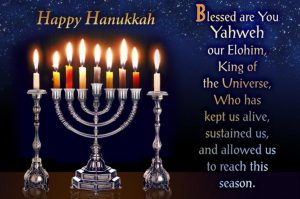
From the pages of Genesis to Revelation, no feast has more clues about its prophetic approach than Hanukkah. This so-called “optional” feast that Jews keep though it is not in Tanakh and most Christians do not keep though it is in Yochanan 10, is one important enough to Yeshua that he went 90 miles in the rain and mud to get to Jerusalem, knowing he would get in and argument and yet proclaimed to the Pharisees, “I and my Father are one.” Join the journey to see Hanukkah also foreshadowed centuries in advance by Nehemiah and others.
- Vayeshev (Audio Portion)
Vayeshev means “and he dwelled.” This portion opens with the amazing story of Joseph, starting with his being sold into slavery to Midianite traders who in turn sell him in Egypt. The parsha then interrupts the Joseph story with the account of Judah and Tamar, but then resumes talking about Joseph first being tempted by his master’s wife only to have his abstinence backfire and land him in prison. Once there, Joseph’s intellect gets him noticed and he makes prophecies that come true for two prisoners, the baker and the wine taster. The baker is killed but the wine taster …
- Vayishlach (Audio Portion)
Vayishlach means “and he sent” and once again the ‘he’ is Jacob sending messengers ahead with gifts in an attempt to reconcile with Esau, and what follows is for me, bar none, the greatest apology EVER given in Scripture. After that we get the tragic story of Dinah and Shechem where he rapes her and, even though he later wishes to make it right by marrying her, the sons of Israel exact revenge anyway. This is followed by a rather unique wrestling match—in this corner, the cunning man of Canaan, Jacob! And in that corner-uh-Yeshua the Messiah! Guess who wins. …
- Vayetze (Audio Portion)
Vayetze means “and he departed” the “he” being Jacob heading towards Haran. At Haran Jacob has his famous vision of the heavenly ladder before proceeding to dwell with his uncle Laban. This of course sets up the struggle with Jacob wanting Rachel but being forced to marry Leah first and then Rachel as he toils for a total of twenty years. After finally escaping, Jacob finds himself trapped between a deceptive uncle he left behind and a brother who publicly swore to kill him coming towards him with hundreds of armed men.
- Toldot (Audio Portion)
Toldot means “generations” or “family records,” referring to the lineage of Isaac. The troubled sibling rivalry of Jacob and Esau is the focus here. Jacob will eventually steal Esau’s birthright and blessing before running away. But as crafty as Jacob is he will find his uncle Laban even more deceitful and it is Laban who will outmaneuver Jacob for 20 years before Jacob gains advantage again. We also have the third occurrence—this time with Isaac and Abimelech II—of a wife (Rebecca this time) being passed off as a “sister” because a patriarch was afraid for his life. The portion ends …
- Chayey Sarah (Audio Portion)
Chayei Sarah means “life of Sarah” but ironically it begins with her death! The full meaning actually is “the Life of Sarah WAS.” In the wake of her death, Abraham must find an appropriate place to bury his wife. Ephron the Hittite first offers some land to Abraham for free, but Abraham insists on paying (actually OVERPAYING according to the rabbis) and signing a contract for the land to avoid future strife. Chapter 24 then gives us the beautiful love story between Isaac and Rebecca. It becomes clear that while Isaac himself gets little attention in Torah compared to his …
- Vayera (Audio Portion)
Shalom everyone. Before getting to the parsha, I wanted to apologize to all of you for having only half a parsha this week. Due to problems that are completely of my own making and my fault entirely, I was only able to do two videos this week. I take my charge of providing fresh content every week very seriously and I feel terrible to have fallen short. But in the meantime, I thought I would provide a little extra content right now–teachings I have not posted in a while and are not on the home page. I know this …
- Lech Lecha (Audio Portion)
Lech Lecha means “get yourself out” or “go to yourself.” It concerns the command Abba YHWH gives Abram to into Canaan and has a lot of great “action” surrounding that main theme. First, move Abram has a bit of an adventure in Egypt when his wife acquired by Pharaoh because Abram said she was his sister! Then Abram had to do some intricate planning to get ahead of a potential family dispute between himself and his nephew Lot. After that a whole bunch of kings go to war around Abram and closer to home Abram is given the second most …
- Noach (Audio Portion)
Noach refers to Noah, a righteous man whose name means “comfort” or “peace.” Abba YHWH tells Noah He is about to flood all of humanity out of existence except for himself, his wife, their three sons and three daughters in law. After the Flood, humanity tries to start over but there is still great evil about as Nimrod becomes a great and powerful leader and those (perhaps) under his influence attempt to build a tower to rival heaven, forcing Abba YHWH to confuse human language ever since. Genealogy brings us to the time of Abraham, thus setting up the covenant …
- Bereshit (Audio Portion)
Bereshit means “in the beginning.” We start with the six days of creation with Abba YHWH resting on the Shabbat day and creating Adam and Eve. After their expulsion from paradise, Adam and Eve have two sons, Cain and Abel and the former kills the latter. Afterwards, Cain flees Abba YHWH’s presence, first to Nod and then he goes build a city. As the human race begins to spread throughout the earth, the first ten generations are recounted and the life of righteous Noah is introduced.
- Vayelech-Ha’azinu-Shabbat Shuvah (Audio Portion)
Vayelech means, “and he went out/walked” referring of course to Moshe. The portion begins in a time of transition, where Joshua is brought forward as the next leader and final instructions to Israel are given. The portion ends with Moshe recording the words to a song, but those words are not given until the following portion, Ha’azinu.
Ha’azinu means “give your ears” or “listen.” It is the opening stanza of Moshe’s last song that he spoke of at the end of the previous portion. Although the language is poetic, the graphic imagery is meant for easy remembrance and its warnings are … - Ki Tavo-Nitzavim (Audio Portion)
Ki Tavo means “when you enter” and begins with a variety of agricultural regulations that take effect once Israel has entered Canaan. Other regulations, such as that of tithing, are further instituted in the 26th chapter. 26 also contains a veiled rebuke from Moshe to the previous generation as he points out how good the land was, just as Abba YHWH commanded but this was not accepted as fact by Israel.
As 27 opens, the Israelites will then hurl blessings from Mount Gerizim and curses from Ebal, as we spoke at length about earlier. The curses are a re-statement of the … - Ki-Teze (Audio Portion)
Ki Teze means “when you go out” as in terms of when Israel confronts her enemies on the battle field. One main war regulation is given at the start, and that is what to do with a woman taken captive from the nations that a Jewish man wants to make a wife. From there other requirements about marriage under other circumstances follow that have nothing to do with war. Many other marital and purity regulations follow for the remainder of this portion.
- Shoftim (Audio Portion)
Shoftim means “judges” and Deuteronomy 16:18begins with the command to appoint them. The Torah had suggested that these courts had to be established to resolve general disputes (Exodus 21:22, 22:8) but only here do we find the specific command to set these courts up in every city, probably because prior to this time they were not close to being settled in the land. Other warnings to kill idolaters in their midst follow along the lines of Deuteronomy 13 but lacking the provision that they do so even if predicted signs and wonders come true from the idolater’s mouth. Still other …
- Re’eh (Audio Portion)
Re’eh means “see,” and it begins with that great summary of the covenant: I set aside two ways for you, blessing and cursing, life and death. Shortly afterwards, a number of regulations about the place for Abba YHWH’s Name —Jerusalem though no one other than Abba YHWH knows that yet—are given. Some kosher regulations are restated or clarified and the law of the shemittah is given and explained. The portion wraps up with a restatement of the Hebrew festivals.
- Ekev (Audio Portion)
“Ekev” means “because” or “if only.” Following the theme of last week’s parsha of Va’etchanan, Moshe continues his urgent pleas to this current generation to realize that they are honor-bound to continue in the covenant originally granted to their fathers and that they, in a limited sense, share blame with their fathers for what went wrong. However, the positive side is also great in that they, unlike their fathers can inherit the Promised Land “if only” they obey and repent!
- Va’etchanan (Audio Portion)
Va’etchanan means “and I pleaded” or “and I asked for favor/mercy.” This is Moshe pleading with Abba YHWH one last time to ask to be allowed to enter into the Promised Land. Abba YHWH though utterly refuses and says, “Speak to Me no more on this matter!” After an extensive prologue in chapter 4, the Ten Commandments are re-stated in chapter 5 and the foundational Shema prayer of course is the highlight of the Tanakh as well as chapter 6! The remainder of the portion is concerned with reinforcing obedience as the way to a better life.
- Devarim (Audio Portion)
Devarim means “the words” and as the book opens we enter the last day of Moshe’s life. Moshe begins the book by recapping the details of the last 40 years. The portion ends with Moshe reminding Israel of the times that Abba YHWH fought for them. Now that the evil generation is gone, the time has come to strengthen their children by having them know that Abba YHWH is with them as they enter Canaan.
- Masei (Audio Portion)
Masei means “the journeys,” and the entire 33rd chapter is devoted to the list of the 42 places the Israelites stopped at along the way to Canaan. The rest of the portion concerns detailed rules about what the land’s borders will be, which tribe gets what, and general rules on inheritance. There is a sequel at the end of the portion where the daughters of Tzelophehad are told they must marry within their tribe to inherit. If they marry outside, they do not get their inheritance.
- Mattot (Audio Portion)
Mattot means “the tribes,” but also has very interesting secondary meanings of “staff, scepter, rod, branch,” all of which seem relevant here. The portion opens with a discussion on the need to fulfill valid oaths to Abba YHWH to the letter-valid meaning that the oath is not contradictory to Abba YHWH’s laws or pronouncements. Various examples and applications of this principle follow. Then it is time to actually go to war against Midian. It is interesting that the previous portion had Israel get ready for this mentally, by totally changing their attitude and then Abba YHWH says, “Now is the …
- Pinchas (Audio Portion)
Pinchas refers to the man whose righteous example of purging evil from Israel’s ranks moved Abba YHWH to stop a plague that would have otherwise destroyed all Israel. More than that, the portion starts with Pinchas getting a particularly high honor from Abba YHWH, the covenant of peace that rests on him alone and ensures his progeny the high priesthood. But with the population of Israel decimated by the plague, a new census had to be done in chapter 26. When that counting was concluded, Moshe is then given a very interesting issue to deliberate on: Should women be allowed …
- Balak (Audio Portion)
Balak refers to the man, Balak of Zippor, who was the king of Moab and a resolute enemy of Israel. When Balak then hears of a man named Balaam who can predict the future and cast curses, he hires him to curse Israel. However, Balaam can truly hear Abba YHWH’s Will and Abba YHWH tells him plainly that he can’t curse Israel. On three occasions the king of Moab wants a curse against Israel but only gets blessings for them instead. And then Balaam gives a fourth blessing on his way out—one for the proverbial road as it were.
Ironically also, … - Chukkat (Audio Portion)
“Chukkat” means “statute” and the portion opens with the requirements of the famous red heifer, that perfect red young cow that is so sacred, nothing else will do to inaugurate the entire sacrificial infrastructure. Not surprisingly then, the requirements for finding and then preparing for such a massively important sacrifice are detailed and intricate. Other purity laws follow after which we are confronted with the sad news of Moshe’s sister Miriam dying. Ironically, instead of Moshe getting compassion from the Israelites on this occasion they immediately rise up in rebellion against him once more!
In response to this latest threat, Abba … - Korach (Audio Portion)
“Korach” refers to the man of the same name who was responsible for mounting a rebellion against Moshe. There are many unique aspects to this act of rebellion, such as it being led by a Levite and a confederation of other
leaders, and that Moshe and Aaron are on the same side against them. We also have touches of foreshadowing of Eliyahu’s later contest against the prophets of Baal. The results of this rebellion are among the most graphic of disasters depicted in Tanakh. Because the very fabric of the priesthood was threatened, the stakes for the right side surviving were … - Shelach Lecha (Audio Portion)
Shelach Lecha means “send out for yourself,” referring to the spies that Moshe will send into Canaan to do a little “reconnaissance” on the strategic strengths of the various peoples living in Canaan. When the spies let their fear get the better of them and bring back an evil report, Abba YHWH officially enacts punishment that they will spend an additional 40 years wandering in the wilderness, or a total of 42 years from the time they left Egypt. However Caleb and Joshua prove themselves to be the voices of righteousness and will not give into fear. Then, for the …
- Behalotekha (Audio Portion)
“BeHalotekha” means “when you elevate” as in “when you lift up the lamps.” Aaron is commanded to light the lamps of the menorah and the tribe of Levi is commanded to serve the sanctuary. This is also when the institution of the
2nd Pesach is established and when the Israelites grumble over only having manna to eat as well as showing rebellion against Moshe from his own siblings! - Naso (Audio Version)
“Naso” means “take,” as in “you will take an accounting of Israel” or a census. This portion begins with the census on the Gershonites and details all their prescribed duties in ministering to the Tabernacle. This is followed by the bitter waters test for an adulterous woman in Numbers 5 and other instructions for the sons of Aaron, culminating with the Blessing of the Priests in chapter 6. The 7th and last chapter in the portion details the
contributions for the Tabernacle made by each tribal leader. - Bamidbar (Audio Portion)
“BaMidbar” means “in the wilderness” and it begins with a census being taken of the nation, particularly of men 20 years and older who can serve in combat. The total comes to 603,550 except Levites who cannot be counted for this purpose. After this more details are given for how the Levites are to maintain the Tabernacle and their own purity.
- BaHar-BeChukkotai (Audio Portion)
“BaHar” means at the mountain, from which Abba YHWH gives this series of instructions. It concerns itself with the intricate Jubilee and Land Sabbath rules, which I will be discussing from Torah and giving my take on them in the Eternal Torah Calendar system.
“BeChukkotai” means “by/through My statutes,” referring to Abba YHWH’s judgments being “walked in” or followed. There is a distinction made between “laws” and “statutes” and “commandments” which we will look into later. This portion though goes beyond just listing a bunch of rules; it deals with the rewards for obedience and punishments for disobedience. Most striking of … - Emor (Audio Portion)
“Emor” means “he said” and it is heavily concerned with purity regulations, but it then shifts into a bigger picture with restoring and re stating the sacred year. Abba YHWH does this to show the Israelites to know they renew their covenant by following His instructions, so He repeats these rules to reassure Israel their covenant continues.
- Acharei-Mot-Kedoshim (Audio Portion)
“Aharei Mot” means “after the death,” referring to the demise of Aaron’s sons Nadab and Abihu who offered fire in a way not sanctioned by Abba YHWH. The portion begins with the purification measures that Aaron and his remaining sons need to go through to rectify the evil that was done in Abba YHWH’s sight. Once done, additional purity regulations are given on how native Israelites are to slaughter and handle blood. Abba YHWH then opens the last chapter in this portion by reminding Israel that they are not to do the practices of the peoples either from where they …
- Tazria-Metzora (Audio Porton)
“Tazria” means “to bring seed, give birth.” It begins with the “niddah” rules, or how a woman is unclean for a certain period after giving birth. The rest of the portion then deals with how lepers are to be isolated and pronounced clean by the priests before being allowed to rejoin Israel.
“Metzora” or more precisely “Ha Metzora” means “The Leper,” and the portion concerns primarily how a leper gets pronounced clean by the priests, how he demonstrates he has been cleansed from the disease. The previous Torah portion (Tazria) concerned states of impurity and isolation for women who have just … - Tzav (Audio Portion)
Tzav means “command” as in commanding the sons of Aaron. It is another form of the same root we saw in an earlier parsha “tetzaveh” or “you will command/charge.” This time the focus of the portion is on the priestly responsibilities in preparing sacrifices.
- Vayikra (Audio Portion)
“Vayikra” means “and he called” and seems focused on the details about the various offerings and sacrifices that are needed for and by the priests of Aaron. I say “seems focused” because there are a lot of deep spiritual realities laying beneath the surface when we delve into the meanings of these rituals.
- Vayachel-Pekudei (Audio Portion)
“Vayachel” means “and he assembled.” The verb is derived from KAHAL, Hebrew word for “assembly, congregation.” After a brief sermon on the importance of Shabbat, Moshe then gets the Israelites to work on the manifold details of building the Tabernacle and related furniture and objects.
“Pekudei” means “these are the records/expenses” and the portion opens with giving the pricing values for the materials that will be used in the Tabernacle. Many exacting physical (and spiritual) details are given for all the wondrous objects and the Tabernacle. But after all these long lists (from this portion and the previous ones) we finally … - Tetzaveh (Audio Portion)
“Tetzaveh” means “you will charge/command,” which opens with requirements for worship that are so important that failure to comply is simply not an option. If these needs are not met, nothing good will ever come about from that nation of Israel. We then get a lot of details about the designs of the priestly garments (ch. 28) and how the priests themselves are to be consecrated (ch. 29). The remaining 11 lines in ch. 30 concern instructions for building the altar.
- Terumah (Audio Portion)
Terumah means “the contributions” concerns a list of the offerings Israel gives to help build the Tabernacle in the wilderness as well as detailed instructions for building the Ark of the Covenant and other “divine furniture. Video #3 also contains the “Windows of Heaven” teaching which I get requests on from time to time.
- Mishpatim (Audio Portion)
“The Judgments” concerns a list of rules and regulations that Abba YHWH is giving to Israel. They involve practical examples from the root commands given at Sinai. However, there is much more going on here than a mere laundry list of obligations. Sandwiched between these rules are some of the most powerful insights that Abba YHWH has ever imparted to man. It’s as if we have to wade through the rules to get to the reward of these insights. Hey, that sounds a lot like life too!
- Yitro (Audio Portion)
It is very significant that this parsha is named “Jethro” and not “The Ten Words” or Commandments that it contains. In a sense the advice that Jethro gives Moshe is just as important as the Ten Commandments because it shows YHWH’s plan. First Moshe needs to keep himself from getting exhausted. Then he needs to set the leaders of the nation of Israel on the right course and encourage discussion between them and the people. And finally, the people need to understand that when Abba YHWH says “Don’t go there or you will die” that He is serious! Only then, …
- Be’shelach (Audio Portion)
“Be’shelach” means “let go,” and the portion begins with Pharaoh regretting his decision to free the Hebrews, so he musters his chariots in an attempt to bring them all back. Instead however Abba YHWH parts the waters of the Reed Sea and destroys Pharaoh’s army. But even as Israel rejoices, her trials are just beginning. After leaving camp from Elim on the 15th day (proving lunar sabbath wrong), the Israelites complain they don’t have enough meat, Abba
YHWH sends a flock of quail and this is the first appearance of the mysterious Manna bread. The portion ends with a key victory … - Bo (Audio Portion)
“Bo” means “go,” and that’s exactly what the Israelites do! After the last three plagues of locusts, darkness and killing the first born of Egypt do their damage, Pharaoh at last relents and lets Israel go. In the stunning aftermath of these events, the Pesach meal is instituted as an eternal memorial.
- Va’Era (Audio Portion)
Va’Era means “and I appeared,” as in Abba YHWH explaining that He appeared to Abraham, Isaac and Jacob and this thought of course follows from His introduction in Shemot that Moshe is a descendant of these people, “I am the El of your fathers.” After the initial “Bricks Without Straw” setback which happened last week, Moshe is strengthened to go back to Pharaoh though neither he nor his own people seem willing to do the right thing. Now also the “warning period” is over and Abba YHWH prepares to begin the real battle. After the signs of the serpent and …
- Shemot (Audio Portion)
Shemot means “the names,” and it is almost impossible to do justice in a few lines to such a majestic portion. We begin with the set-up of “the Pharaoh who did not know Joseph” and who therefore enslaves the Israelites (probably Ahmose I). Despite an edict to kill all Hebrew male infants, Moshe escapes and is adopted by the Pharaoh’s daughter called “Bithia” by the Scripture and the rabbis, “Thermuthis” by Josephus or “Tarmuth” by the Talmud. Moshe is raised as a Prince of Egypt until he kills an overseer for beating a Hebrew slave. Then he flees to Midian …
- Vayechi (Audio Portion)
Vayechi means “and he lived,” referring to the 17 years Ya’akov would spend in Egypt before dying. The portion begins with Jacob making final arrangements to be buried in Canaan once he dies. Ironically, the portion ends with Joseph making those same arrangements but deferring final relocation until the Exodus. It seems that Joseph’s final vision then was his foretelling the time of Moshe. In between these events, Joseph’s sons Ephraim and Manasseh are introduced to Jacob and in a very ironic twist Jacob does intentionally the same thing his father Isaac was deceived into doing by blessing the younger …
- Vayigash (Audio Portion)
Vayigash means “and he approached,” referring to Judah approaching Joseph and pleading with him to return Benjamin. After this plea Joseph reveals his true identity and begins reconciling with his brothers. The portion ends with Joseph sending his brothers to fetch Jacob into Egypt and setting up the main foundation pieces for what will become the Exodus.
- Mikkets (Audio Portion)
Mikkets means “at the end” as in at the end of two years since Joseph interpreted the dreams of the baker and wine taster, and about three and half years for the total time of Joseph’s confinement. When Pharaoh has bad dreams and can’t get any of his seers to interpret them, the wine taster remembers Joseph and tells Pharaoh he can help. After Joseph correctly interprets the dream, he is quickly elevated to the second in command, given an Egyptian priestess for wife and moves forward with his plan for storing grain during the years of plenty. The rest …
- 2022 Hanukkah Special (Audio Portion)

From the pages of Genesis to Revelation, no feast has more clues about its prophetic approach than Hanukkah. This so-called “optional” feast that Jews keep though it is not in Tanakh and most Christians do not keep though it is in Yochanan 10, is one important enough to Yeshua that he went 90 miles in the rain and mud to get to Jerusalem, knowing he would get in and argument and yet proclaimed to the Pharisees, “I and my Father are one.” Join the journey to see Hanukkah also foreshadowed centuries in advance by Nehemiah and others. Also, for those …
- Vayeshev (Audio Portion)
Vayeshev means “and he dwelled.” This portion opens with the amazing story of Joseph, starting with his being sold into slavery to Midianite traders who in turn sell him in Egypt. The parsha then interrupts the Joseph story with the account of Judah and Tamar, but then resumes talking about Joseph first being tempted by his master’s wife only to have his abstinence backfire and land him in prison. Once there, Joseph’s intellect gets him noticed and
he makes prophecies that come true for two prisoners, the baker and the wine taster. The baker is killed but the wine taster was … - Vayishalach (Audio Portion)
Vayishlach means “and he sent” and once again the ‘he’ is Jacob sending messengers ahead with gifts in an attempt to reconcile with Esau, and what follows is for me, bar none, the greatest apology EVER given in Scripture. After that we get the tragic story of Dinah and Shechem where he rapes her and, even though he later wishes to make it right by marrying her, the sons of Israel exact revenge anyway.
- Vayetze (Audio Portion)
Vayetze means “and he departed” the “he” being Jacob heading towards Haran. At Haran Jacob has his famous vision of the heavenly ladder before proceeding to dwell with his uncle Laban. This of course sets up the struggle with Jacob wanting Rachel but being forced to marry Leah first and then Rachel as he toils for a total of twenty years. After finally escaping, Jacob finds himself trapped between a deceptive uncle he left behind and a brother who publicly swore to kill him coming towards him with hundreds of armed men.
- Toldot (Audio Portion)
Toldot means “generations” or “family records,” referring to the lineage of Isaac. The troubled sibling rivalry of Jacob and Esau is the focus here. Jacob will eventually steal Esau’s birthright and blessing before running away. But as crafty as Jacob is he will find his uncle Laban even more deceitful and it is Laban who will outmaneuver Jacob for 20 years before Jacob gains advantage again. We also have the third occurrence—this time with Isaac and Abimelech II—of a wife (Rebecca this time) being passed off as a “sister” because a patriarch was afraid for his life. The portion ends …
- Chayei Sarah (Audio Portion)
Chayei Sarah means “life of Sarah” but ironically it begins with her death! The full meaning actually is “the Life of Sarah WAS.” In the wake of her death, Abraham must find an appropriate place to bury his wife. Ephron the Hittite first offers some land to Abraham for free, but Abraham insists on paying (actually OVERPAYING according to the rabbis) and signing a contract for the land to avoid future strife.
Chapter 24 then gives us the beautiful love story between Isaac and Rebecca. It becomes clear that while Isaac himself gets relatively little attention in Torah compared to his … - Vayera (Audio Portion)
Vayera means “and appeared,” referencing Abba YHWH, appearing to Abraham with two other messengers. The trio brings news that Abraham and Sarah will have a son. Sarah, not believing Abba YHWH, laughs at hearing the pronouncement and then denies she laughed. This is one reason they call their son Yitzchak, “laughter.” Notable here also is that Abraham serves Abba YHWH and His two messengers milk and meat!
After this, we get the dark message of Sodom and Gomorrah’s destruction. Abraham’s nephew Lot and his family must leave immediately to avoid the coming disaster. Also, there is a remarkable “bargaining” session between … - Lech Lecha (Audio Version)
Lech Lecha means “get yourself out.” It concerns the command Abba YHWH gives Abram to into Canaan and has a lot of great “action” surrounding that main theme. First, move Abram has a bit of an adventure in Egypt when his wife acquired by Pharaoh because Abram said she was his sister! Then Abram had to do some intricate planning to get ahead of a potential family dispute between himself and his nephew Lot. After that a whole bunch of kings go to war around Abram and closer to home Abram is given the second most difficult test of his …
- Noach (Audio Portion)
Noach refers to Noah, a righteous man whose name means “comfort” or “peace.” Abba YHWH tells Noah He is about to flood all of humanity out of existence except for himself, his wife, their three sons and three daughters in law.
After the Flood, humanity tries to start over but there is still great evil about as Nimrod becomes a great and powerful leader and those (perhaps) under his influence attempt to build a tower to rival heaven, forcing Abba YHWH to confuse human language ever since. The genealogy brings us to the time of Abraham, thus setting up the covenant … - Bereshit (Audio Portion)
Bereshit means “in the beginning.” We start with the six days of creation with Abba YHWH resting on the Shabbat day and creating Adam and Eve. After their expulsion from paradise, Adam and Eve have two sons, Cain and Abel and the former kills the latter. Afterwards, Cain flees Abba YHWH’s presence, first to Nod and then he goes
build a city. As the human race begins to spread throughout the earth, the first ten generations are recounted and the life of righteous Noah is introduced. - Ha’azinu (Audio Portion)
Ha’azinu means “give your ears” or “listen.” It is the opening stanza of Moshe’s last song that he spoke of at the end of the previous portion. Although the language is poetic, the graphic imagery is meant for easy remembrance and its warnings are definitely LITERAL. There is no other poetry done as well in Tanakh except perhaps Job 38-42.
- 2022 Yom Kippur Special (Audio Portion)
From hints embedded in Noah’s Flood to the most terrifying images in Revelation, Yom Kippur is a Set-apart time that impresses itself all over the Scripture. Enjoy and have a great fast!
- Yom Teruah Special (Audio Portion)
Chag Sameyach and welcome to the start of our wonderful fall feast season! We kick off this very special month of Tishri with Yom Teruah, the day of shofar blasting, the seventh new moon of the year and a day that may actually point to the Second Coming of the Messiah. Explore the connections between that and the rabbinic Rosh Hashanna, from from the creation of Adam in Genesis to the deepest patterns of Revelation, Yom Teruah covers it all! Enjoy!
- Ki Tavo (Audio Portion)
Ki Tavo means “when you enter” and begins with a variety of agricultural regulations that take effect once Israel has entered Canaan. Other regulations, such as that of tithing, are further instituted in the 26th chapter. 26 also contains a veiled rebuke from Moshe to the previous generation as he points out how good the land was, just as Abba YHWH commanded but this was not accepted as fact by Israel. As 27 opens, the Israelites will then hurl blessings from Mount Gerizim and curses from Ebal, as we spoke at length about earlier. The curses are a re-statement of …
- Ki Teze (Audio Portion)
Ki Teze means “when you go out” as in terms of when Israel confronts her enemies on the battle field. One main war regulation is given at the start, and that is what to do with a woman taken captive from the nations that a Jewish man wants to make a wife. From there other requirements about marriage under other circumstances follow that have nothing to do with war. Many other marital and purity regulations follow for the remainder of this portion.
- Shofetim (Audio Portion)
Shofetim means “judges” and Deuteronomy 16:18 begins with the command to appoint them. The Torah had suggested that these courts had to be established to resolve general disputes (Exodus 21:22, 22:8) but only here do we find the specific command to set these courts up in every city, probably because prior to this time they were not close to being settled in the land. Other warnings to kill idolaters in their midst follow along the lines of Deuteronomy 13 but lacking the provision that they do so even if predicted signs and wonders come true from the idolater’s mouth. Still …
- Re’eh (Audio Portion)

Re’eh means “see” and it begins with that great summary of the covenant: I set aside two ways for you, blessing and cursing, life and death. Shortly afterwards, a number of regulations about the place for Abba YHWH’s Name—Jerusalem though no one other than Abba YHWH knows that yet — are given. Some kosher regulations are restated or clarified and the law of the shemittah is given and explained. The portion wraps up with a restatement of the Hebrew festivals.
- Ekev (Audio Portion)
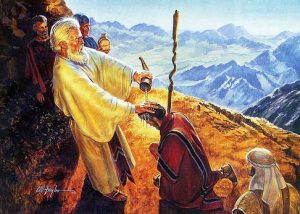
“Ekev” means “because” or “if only” Following the theme of last week’s parsha of Va’etchanan, Moshe continues his urgent pleas to this current generation to realize that they are honor-bound to continue in the covenant originally granted to their fathers and that they, in a limited sense, share blame with their fathers for what went wrong.
However, the positive side is also great in that they, unlike their fathers can inherit the Promised Land “if only” they obey and repent! - Va’etchanan (Audio Portion)
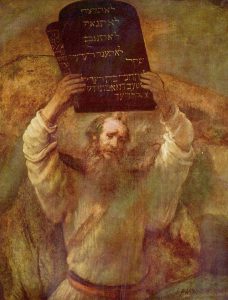
Va’etchanan means “and I pleaded” or “and I asked for favor/mercy.” This is Moshe pleading with Abba
YHWH one last time to ask to be allowed to enter into the Promised Land. Abba YHWH though utterly refuses and says, “Speak to Me no more on this matter!” After an extensive prologue in chapter 4, the Ten Commandments are re-
stated in chapter 5 and the foundational Shema prayer of course is the highlight of the Tanakh. as well as chapter 6! The remainder of the portion is concerned with reinforcing obedience as the way to a better life. - Devarim (Audio Portion)

The last day of Moshe’s life begins and the stakes could not be higher. Israel has a new but unexperienced generation tasked with outdoing their fathers who failed in sight of so many miracles. They will either take the Torah to the nations or die soon after entering the Promised Land. Never has Moshe’s message had a greater sense of urgency!
Devarim Final.mp3 - Masei (Audio Portion)

Masei means “the journeys,” and the entire 33rd chapter is devoted to the list of the 42 places the Israelites stopped at along the way to Canaan. The rest of the portion concerns detailed rules about what the land’s borders will be, which tribe gets what, and general rules on inheritance. There is a sequel at the end of the portion where the daughters of Tzelophehad are told they must marry within their tribe to inherit. If they marry outside, they do not get their inheritance.
- Mattot (Audio Portion)
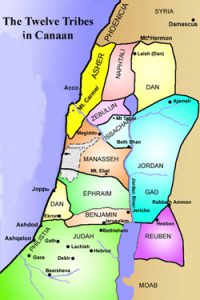
Mattot means “the tribes,” but also has very interesting secondary meanings of “staff, scepter, rod, branch,” all of which seem relevant here. The portion opens with a discussion on the need to fulfill valid oaths to Abba YHWH to the letter-valid meaning that the oath is not contradictory to Abba YHWH’s laws or pronouncements. Various examples and applications of this principle follow. Then it is time to actually go to war against Midian. It is interesting that the previous portion had Israel get ready for this mentally, by totally changing their attitude and then Abba YHWH says, “Now is the …
- Balak (Audio Portion)
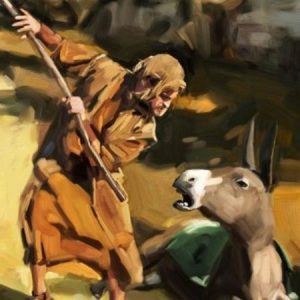
Balak refers to the man, Balak of Zippor, who was the king of Moab and a resolute enemy of Israel. When Balak then hears of a man named Balaam who can predict the future and cast curses, he hires him to curse Israel. However, Balaam can truly hear Abba YHWH’s Will and Abba YHWH tells him plainly that he can’t curse Israel. On three occasions the king of Moab wants a curse against Israel but only gets blessings for them instead. And then Balaam gives a fourth blessing on his way out—one for the proverbial road as it were.
Ironically also, … - Chukkat (Audio Portion)

“Chukkat” means “statute” and the portion opens with the requirements of the famous red heifer, that perfect red young cow that is so sacred, nothing else will do to inaugurate the entire sacrificial infrastructure. Not surprisingly then, the requirements for finding and then preparing for such a massively important sacrifice are detailed and intricate. Other purity laws follow after which we are confronted with the sad news of Moshe’s sister Miriam dying. Ironically, instead of Moshe getting compassion from the Israelites on this occasion they immediately rise up in rebellion against him once more! In response to this latest threat, …
- Korach (Audio Portion)

“Korach” refers to the man of the same name who was responsible for mounting a rebellion against Moshe. There are many unique aspects to this act of rebellion, such as it being led by a Levite and a confederation of other leaders, and that Moshe and Aaron are on the same side against them. We also have touches of foreshadowing of Eliyahu’s later contest against the prophets of Baal. The results of this rebellion are among the most graphic of disasters depicted in Tanakh. Because the very fabric of the priesthood was threatened, the stakes for the right side surviving …
- Shelach Lecha (Audio Portion)
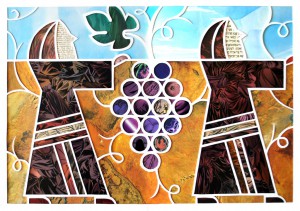
“Shelach Lecha” means “send out for yourself,” referring to the spies that Moshe will
send into Canaan to do a little “reconnaissance” on the strategic strengths of the various
peoples living in Canaan. When the spies let their fear get the better of them and bring
back an evil report, Abba YHWH officially enacts punishment that they will spend an
additional 40 years wandering in the wilderness, or a total of 42 years from the time they
left Egypt. However Caleb and Joshua prove themselves to be the voices of righteousness
and will not give into fear.
Then, for the second time, Abba YHWH offers to destroy … - Be’halotekha (Audio Portion)

“BeHalotekha” means “when you elevate” as in “when you lift up the lamps.” Aaron is commanded to light the lamps of the menorah and the tribe of Levi is commanded to serve the sanctuary. This is also when the institution of the
2nd Pesach is established and when the Israelites grumble over only having manna to eat as well as showing rebellion against Moshe from his own siblings! - Naso (Audio Portion)

“Naso” means “take,” as in “you will take an accounting of Israel” or a census. This portion begins with the census on the Gershonites and details all their prescribed duties in ministering to the Tabernacle. This is followed by the bitter waters test for an adulterous woman in Numbers 5 and other instructions for the sons of Aaron, culminating with the Blessing of the Priests in chapter 6. The 7th and last chapter in the portion details the contributions for the Tabernacle made by each tribal leader.
- Bamidbar (Audio Portion)

“BaMidbar” means “in the wilderness” and it begins with a census being taken of the nation, particularly of men 20 years and older who can serve in combat. The total comes to 603,550 except Levites who cannot be counted for this purpose. After this more details are given for how the Levites are to maintain the Tabernacle and their own purity.
- Be’chukkotai (Audio Portion)

“BeChukkotai” means “by/through My statutes,” referring to Abba YHWH’s judgments being “walked in” or followed. There is a distinction made between “laws” and “statutes” and “commandments” which we will look into later. This portion though goes beyond just listing a bunch of rules; it deals with the rewards for obedience and punishments for disobedience. Most striking of these enactments is the prediction in 26:34-35, where Israel is warned they will be vomited out of the land if they fail to keep the Land Sabbath. The 27th chapter has extensive
details on the monetary values of making an oath of consecration regarding … - BaHar (Audio Portion)
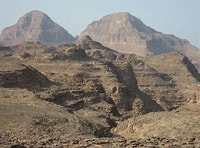
“BaHar” means at the mountain, from which Abba YHWH gives this series of instructions. It concerns itself with the intricate Jubilee and Land Sabbath rules, which I will be discussing from Torah and giving my take on them in the Eternal Torah Calendarsystem.
- Emor (Audio Portion)

“Emor” means “he said” and it is heavily concerned with purity regulations, but it then shifts
into a bigger picture with restoring and re stating the sacred year. Abba YHWH does this to
show the Israelites to know they renew their covenant by following His instructions, so He
repeats these rules to reassure Israel their covenant continues. - Kedoshim (Audio Portion)

“Kedoshim” means “you shall be Set-apart.” This is a kind of “Cliff Notes” style discussion of some of the main themes of the overall Torah. It includes some of the Ten Words (Commandments) but not all of them and wraps around the ones it does include with either brief application advice or other commands that the text didn’t have the chance to get to yet.
. - Aharei Mot (Audio Portion)
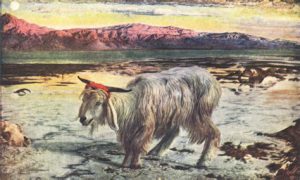
“Aharei Mot” means “after the death,” referring to the demise of Aaron’s sons Nadab and Abihu who offered fire in a way not sanctioned by Abba YHWH. The portion begins with the purification measures that Aaron and his remaining sons need to go through to rectify the evil that was done in Abba YHWH’s sight. Once done, additional purity regulations are given on how native Israelites are to slaughter and handle blood. Abba YHWH then opens the last chapter in this portion by reminding Israel that they are not to do the practices of the peoples either from where they …
- 2022 Pesach Special (Audio Portion)
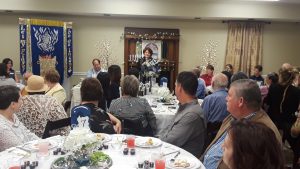
From deep clues from Noah’s Flood to the death and resurrection of Yeshua the Messiah, explore the surprising history of Pesach from beginning to end!
- Metzora (Audio Portion)

“Metzora” or more precisely “Ha Metzora” means “The Leper,” and the portion concerns primarily how a leper gets pronounced clean by the priests, how he demonstrates he has been cleansed from the disease. The previous Torah portion (Tazria) concerned states of impurity and isolation for women who have just given birth and lepers. This portion deals with how to get the lepers clean again. It then takes an interesting turn to discuss what happens when a whole house becomes unclean before ending with other purity rules for men and women.
- Tazria (Audio Portion)
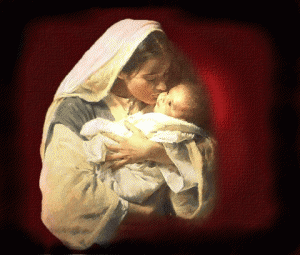
Tazria means “to bring seed, give birth” It begins with the “niddah” rules, or how a woman is unclean for a certain period after giving birth. The rest of the portion then deals with how lepers are to be isolated and pronounced
clean by the priests before being allowed to rejoin Israel. - Shemini (Audio Portion)
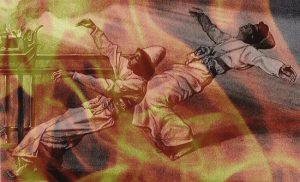
Shemini means “on the 8th day” deals with the end of the priests’ consecration period. After this, they can then make expiation for all of Israel. Unfortunately however, two of Aaron’s sons pay the ultimate price for not ministering properly to the people. The portion then ends with the “kosher list” of what can and cannot be eaten, a perfect segue into our Renewed Covenant reading which also discusses kosher food.
- Tzav (Audio Portion)
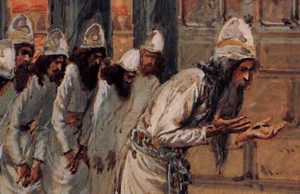
Tzav means “command” as in commanding the sons of Aaron. It is another form of the same root we saw in an earlier parsha “tetzaveh” or “you will command/charge”. This time the focus of the portion is on the priestly responsibilities in preparing sacrifices.
- 2022 Purim Special (Audio Portion)

From a grudge that dates back to Jacob and Esau, to a feast Yahweh commands the Israelites do while still in Egypt that did not happen, to waiting nearly a thousand years for that placeholder of a feast to be fulfilled, few feasts have a greater reach both backwards and forwards than Purim. There is even a deep connection between Purim and one of the most famous battles that ever happened in antiquity, as well as a deep linkage to Yochanan 5. Enjoy!
- Vayikra (Audio Portion)
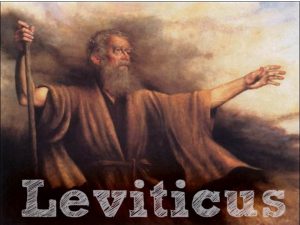
“Vayikra” means “and he called” and seems focused on the details about the various offerings and sacrifices that are needed for and by the priests of Aaron. I say “seems focused” because there are a lot of deep spiritual realities laying beneath the surface when we delve into the meanings of these rituals.
- Pekudei (Audio Portion)

“Pekudei” means “these are the records/expenses” and the portion opens with giving the pricing values for the materials that will be used in the Tabernacle. Many exacting physical (and spiritual) details are given for all the wondrous objects and the Tabernacle. But after all these long lists (from this portion and the previous ones) we finally get to the “payoff” in lovely chapter 40. It is in chapter 40, the last of Exodus—that time
begins again as the priests begin their official service for Israel. - Vayachel (Audio Portion)
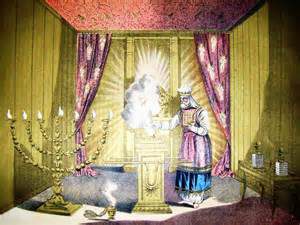
“Vayakhel” means “and he assembled.” The verb is derived from KAHAL, Hebrew for “assembly, congregation.” After a brief sermon on the importance of Shabbat, Moshe then gets the Israelites to work on the manifold details of building the Tabernacle and related furniture and objects.
- Ki Tissa (Audio Portion)

Ki-Tissa means “when you take,” referring to what Israel is to do when it takes a census of all the people. Most censuses in the ancient world are used for the purposes of taxation. This census is no different, except the “tax” is not for an emperor, but for YHWH’s Tabernacle. This “innocent” start though is misleading as it will then progress from those details to the construction of the Ark of the Covenant, only to culminate in disaster when Israel worships the golden calf. In a sense it parallels the pattern we saw with Yitro, except instead of preparation …
- Tetzaveh (Audio Portion)
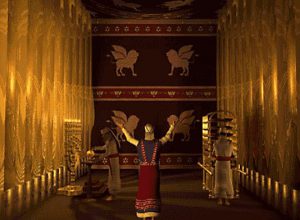
“Tetzaveh” means “you will charge/command,” which opens with requirements for worship that are so important that failure to comply is simply not an option. If these needs are not met, nothing good will ever come about from that nation of Israel. We then get a lot of details about the designs of the priestly garments (ch. 28) and how the priests themselves are to be consecrated (ch. 29). The remaining 11 lines in ch. 30 concern instructions for building the altar.
- Terumah (Audio Portion)
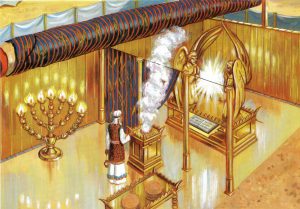
Terumah means “the contributions” concerns a list of the offerings Israel gives to help build the Tabernacle in the wilderness as well as detailed instructions for building the Arkof the Covenant and other “divine furniture.”
- Mishpatim (Audio Portion)

“The Judgments” concerns a list of rules and regulations that Abba YHWH is giving to
Israel. They involve practical examples from the root commands given at Sinai.
However, there is much more going on here than a mere laundry list of obligations.
Sandwiched between these rules are some of the most powerful insights that Abba
YHWH has ever imparted to man. It’s as if we have to wade through the rules to get to
the reward of these insights. Hey, that sounds a lot like life too! - Yitro (Audio Portion)

It’s the behind the scenes story behind one of the most important events in biblical history. The world knows about how Father YHWH gave to Moshe the Ten Commandments, but less well-known is that without the wise counsel of his father-in-law Jethro we would never even get to the this event! Explore the intimate discussion that leads to the most famous Torah utterance of them all!
- Be’shalach (Audio Portion)
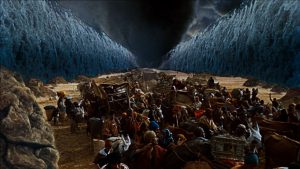
It may be the most iconic biblical image and miracle ever: The parting of the Sea of Reeds. And yet, as impressive as that moment was, it is not enough to inspire long-term loyalty of Israel to Father Yah or to Moshe! Still, at least for a moment, the awe of the Song of Moshe echoes loudly in our ears to inspire us today. Then they mysterious bread from heaven falls, and it is so amazing that the Israelites can only name it “what is it”? Then one epic battle with Amalek remains, and it is a chance for a …
- Bo (Audio Portion)
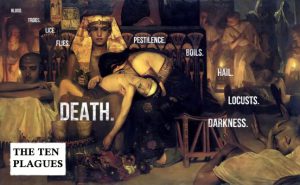
“Bo” means “go,” and that’s exactly what the Israelites do! After the last three plagues of locusts, darkness and killing the first born of Egypt do their damage, Pharaoh at last relents and lets Israel go. In the stunning aftermath of these events, the Pesach meal is instituted as an eternal memorial.
- Va’Era (Audio Portion)
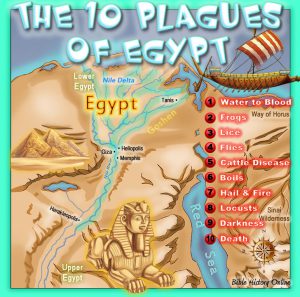
Va’Era means “and I appeared,” as in Abba YHWH explaining that He appeared to Abraham, Isaac and Jacob and this thought of course follows from His introduction in Shemot that Moshe is a descendant of these people, “I am the El of your fathers.” After the initial “Bricks Without Straw” setback which happened last week, Moshe is strengthened to go back to Pharaoh though neither he nor his own people seem willing to do the right thing. Now also the “warning period” is over and Abba YHWH prepares to begin the real battle. After the signs of the serpent and …
- Shemot (Audio Portion)

Shemot means “the names,” and it is almost impossible to do justice in a few lines to such a majestic portion. We begin with the set-up of “the Pharaoh who did not know Joseph” and who therefore enslaves the Israelites (probably Ahmose I). Despite an edict to kill all Hebrew male infants, Moshe escapes and is adopted by the Pharaoh’s daughter called “Bithia” by the rabbis, “Thermuthis” by Josephus or “Tarmuth” by the Talmud. Moshe is raised as a Prince of Egypt until he kills an overseer for beating a Hebrew slave. Then he flees to Midian and is given …
- Vayechi (Audio Portion)
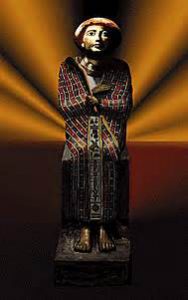
Vayechi means “and he lived,” referring to the 17 years Ya’akov would spend in Egypt before dying. The portion begins with Jacob making final arrangements to be buried in Canaan once he dies. Ironically, the portion ends with Joseph making those same arrangements but deferring final relocation until the Exodus. It seems that Joseph’s final vision then was his foretelling the time of Moshe. In between these events, Joseph’s sons Ephraim and Manasseh are introduced to Jacob and in a very ironic twist Jacob does intentionally the same thing his father Isaac was deceived into doing by blessing the younger …
- Vayigash (Audio Portion)

Vayigash means “and he approached,” referring to Judah approaching Joseph and pleading with him to return Benjamin. After this plea Joseph reveals his true identity and begins reconciling with his brothers. The portion ends with Joseph sending his brothers to fetch Jacob into Egypt and setting up the main foundation pieces for what will become the Exodus.
- Mikkets
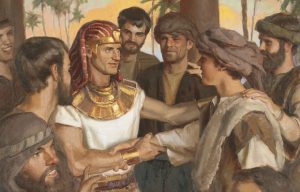
Mikkets means “at the end” as in at the end of two years since Joseph interpreted the dreams of the baker and wine taster, and about three and half years for the total time of Joseph’s confinement. When Pharaoh has bad dreams and can’t get any of his seers to interpret them, the wine taster remembers Joseph and tells Pharaoh he can help. After Joseph correctly interprets the dream, he is quickly elevated to the second in command, given an Egyptian priestess for wife and moves forward with his plan for storing grain during the years of plenty. The rest …
- 2021 Hanukkah Special (Audio Portion)

From literally Genesis to Revelation, Hanukkah has always been a special feast about light, renewal and re-dedication to Yahweh’s Torah and Path. See the clues to the “hidden Hanukkah” of Genesis, Moshe in the book of Numbers, Solomon, Nehemiah and so many others and see how this relatively recent Feast has actually been with us much longer than the historical events that brought its celebration to the forefront of the Jewish people!
- Vayeshev (Audio Portion)

Vayeshev means “and he dwelled.” This portion opens with the amazing story of Joseph, starting with his being sold into slavery to Midianite traders who in turn sell him in Egypt. The parsha then interrupts the Joseph story with the account of Judah and Tamar, but then resumes talking about Joseph first being tempted by his master’s wife only to have his abstinence backfire and land him in prison. Once there, Joseph’s intellect gets him noticed and he makes prophecies that come true for two prisoners, the baker and the wine taster. The baker is killed but the wine taster …
- Vayishlach (Audio Portion)
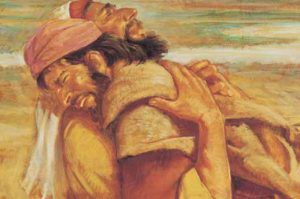
Vayishlach means “and he sent” and once again the ‘he’ is Jacob sending messengers ahead with gifts in an attempt to reconcile with Esau, and what follows is for me, bar none, the greatest apology EVER given in Scripture. After that we get the tragic story of Dinah and Shechem where he rapes her and, even though he later wishes to make it right by marrying her, the sons of Israel exact revenge anyway. This is followed by a rather unique wrestling match—in this corner, the cunning man of Canaan, Jacob! And in that corner-uh-Yeshua the Messiah! Guess who wins. …
- Vayetze (Audio Portion)
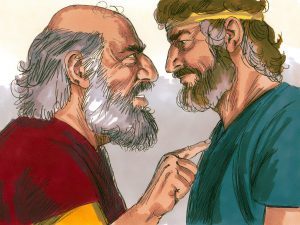
Vayetze means “and he departed” the “he” being Jacob heading towards Haran. At Haran Jacob has his famous vision of the heavenly ladder before proceeding to dwell with his uncle Laban. This of course sets up the struggle with Jacob wanting Rachel but being forced to marry Leah first and then Rachel as he toils for a total of twenty years. After finally escaping, Jacob finds himself trapped between a deceptive uncle he left behind and a brother who publicly swore to kill him coming towards him with hundreds of armed men.
- Toldot (Audio Portion)
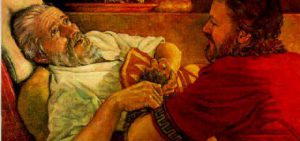
Toldot means “generations” or “family records,” referring to the lineage of Isaac. The
troubled sibling rivalry of Jacob and Esau is the focus here. Jacob will eventually steal
Esau’s birthright and blessing before running away. But as crafty as Jacob is he will find
his uncle Laban even more deceitful and it is Laban who will outmaneuver Jacob for 20
years before Jacob gains advantage again. We also have the third occurrence—this time
with Isaac and Abimelech II—of a wife (Rebecca this time) being passed off as a “sister”
because a patriarch was afraid for his life. The portion ends with Esau taking another
wife. - Chayei Sarah (Audio Portion)
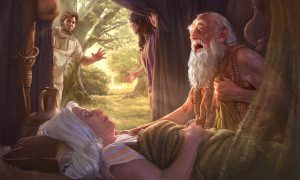
Chayei Sarah means “life of Sarah” but ironically it begins with her death! The full meaning actually is “the Life of Sarah WAS”. In the wake of her death, Abraham must find an appropriate place to bury his wife. Ephron the Hittite first offers some land to Abraham for free, but Abraham insists on paying (actually OVERPAYING according to the rabbis) and signing a contract for the land to avoid future strife. Chapter 24 then gives us the beautiful love story between Isaac and Rebecca. It becomes clear that while Isaac himself gets relatively little attention in Torah compared to …
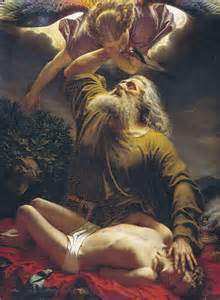
Vayera means “and appeared,” referencing Abba YHWH, appearing to Abraham with two other messengers. The trio brings news that Abraham and Sarah will have a son. Sarah, not believing Abba YHWH, laughs at hearing the pronouncement and then denies she laughed. This is one reason they call their son Yitzchak, “laughter.” Notable here also is that Abraham serves Abba YHWH and His two messengers milk and meat!
After this, we get the dark message of Sodom and Gomorrah’s destruction. Abraham’s nephew Lot and his family must leave immediately to avoid the coming disaster. Also, there is a remarkable “bargaining” session between …- Lech lecha (Audio Portion)
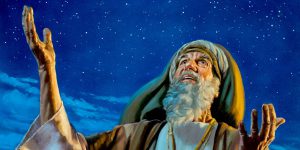
Lech Lecha means “get yourself out.” It concerns the command Abba YHWH gives Abram to into Canaan and has a lot of great “action” surrounding that main theme. First, move Abram has a bit of an adventure in Egypt when his wife acquired by Pharaoh because Abram said she was his sister! Then Abram had to do some intricate planning to get ahead of a potential family dispute between himself and his nephew Lot. After that a whole bunch of kings go to war around Abram and closer to home Abram is given the second most difficult test of his …
- Noach (Audio Portion)

Noach refers to Noah, a righteous man whose name means “comfort” or “peace.” Abba
YHWH tells Noah He is about to flood all of humanity out of existence except for
himself, his wife, their three sons and three daughters in law.
After the Flood, humanity tries to start over but there is still great evil about as Nimrod
becomes a great and powerful leader and those (perhaps) under his influence attempt to
build a tower to rival heaven, forcing Abba YHWH to confuse human language ever
since. The genealogy brings us to the time of Abraham, thus setting up the covenant that
is about to happen in … - Bereshit (Audio Portion)

Bereshit means “in the beginning.” We start with the six days of creation with Abba YHWH resting on the Shabbat day and creating Adam and Eve. After their expulsion from paradise, Adam and Eve have two sons, Cain and Abel and the former kills the latter. Afterwards, Cain flees Abba YHWH’s presence, first to Nod and then he goes build a city. As the human race begins to spread throughout the earth, the first ten generations are recounted and the life of righteous Noah is introduced.
- 2021 Sukkot Special Volume 2 (Audio Portion)

Chag Sameyach! From early hints in Genesis linked to Jacob to some of the last parts of Revelation, so Feast has the range and depth of Sukkot. Enjoy this second of two in-depth feast teachings, this one covering more on the special Shabbat during the Feast and the last two special days of the Feast along with the last parsha of the year, Ve-Zot Ha-Barachah. For those looking for a taste of what heaven or the Millennial Kingdom is to be like, look no further than Sukkot. May you all rejoice before YHWH greatly during this Set-Apart time!
- 2021 Sukkot Special Volume 1 (Audio Portion)

Chag Sameyach! From early hints in Genesis linked to Jacob to some of the last parts of Revelation, so Feast has the range and depth of Sukkot. Enjoy this second of two in-depth feast teachings, this one covering more on the special Shabbat during the Feast and the last two special days of the Feast along with the last parsha of the year, Ve-Zot Ha-Barachah. For those looking for a taste of what heaven or the Millennial Kingdom is to be like, look no further than Sukkot. May you all rejoice before YHWH greatly during this Set-Apart time!
- Ha’azinu (Audio Portion)

Ha’azinu means “give your ears” or “listen.” It is the opening stanza of Moshe’s last song that he spoke of at the end of the previous portion. Although the language is poetic, the graphic imagery is meant for easy remembrance and its warnings are definitely LITERAL. There is no other poetry done as well in Tanakh except perhaps Job 38-42.
- 2021 Yom Kippur Special (Audio Portion)
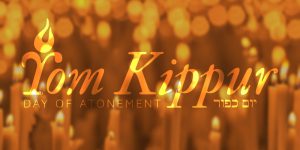
From clues deeply embedded in Noah’s Flood, to some of the most powerful teachings Yeshua the Messiah ever gave and all the way to the ultimate apocalyptic imagery in the Book of Revelation, Yom Kippur is the most sacred day of them all and it lays at the heart of the Scripture itself. Put simply, it doesn’t get more critical than this moment!
- Vayelech (Audio Portion)

Vayelech means, “and he went out/walked” referring of course to Moshe. The portion begins in
a time of transition, where Joshua is brought forward as the next leader and final instructions to
Israel are given. The portion ends with Moshe recording the words to a song, but those words
are not given until the following portion, Ha’azinu. - 2021 Yom Teruah Special (Audio Portion)
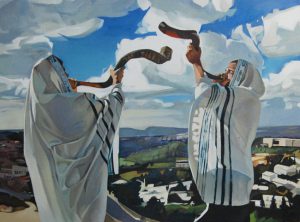
Chag Sameyach and welcome to the start of our wonderful fall feast season! We kick off this very special month of Tishri with Yom Teruah, the day of shofar blasting, the seventh new moon of the year and a day that may actually point to the Second Coming of the Messiah. Explore the connections between that and the rabbinic Rosh Hashanna, from from the creation of Adam in Genesis to the deepest patterns of Revelation, Yom Teruah covers it all! Enjoy!
- Nitzavim (Audio Portion)

Nitzavim means “you stand” and it begins with more warnings for the price of
disobedience. This is literally the beginning of the end of Israelite wandering and
Moshe’s own life, so it is critical that every opportunity be taken to explain Israel’s
responsibilities to them. This is an abnormally short portion. - Ki Tavo (Audio Portion)

Ki Tavo means “when you enter” and begins with a variety of agricultural regulations that take effect once Israel has entered Canaan. Other regulations, such as that of tithing, are further instituted in the 26th chapter. 26 also contains a veiled rebuke from Moshe to the previous generation as he points out how good the land was, just as Abba YHWH commanded but this was not accepted as fact by Israel. As 27 opens, the Israelites will then hurl blessings from Mount Gerizim and curses from Ebal, as we spoke at length about earlier. The curses are, for the most …
- Ki Teze (Audio Portion)

Ki Teze means “when you go out” as in terms of when Israel confronts her enemies on the battle field. One main war regulation is given at the start, and that is what to do with a woman taken captive from the nations that a Jewish man wants to make a wife. From there other requirements about marriage under other circumstances follow that have
nothing to do with war. Many other marital and purity regulations follow for the remainder of this portion. - Shoftim (Audio Portion)
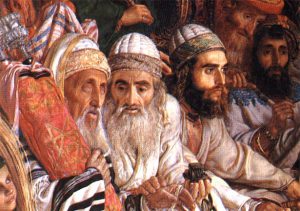
Here the Torah tells us how to set up the ideal legal system of judges and courts, for the benefit of all. How do kosher investigations and kosher witnesses work? How can we know the truth and who is the final arbiter of the verdicts? These and many other fascinating details are fully explained, with the last chapter (16) once again telling us how to keep the Feasts!
- Re’eh (Audio Portion)
Re’eh means “see,” and it begins with that great summary of the covenant: I set aside two ways for you, blessing and cursing, life and death. Shortly afterwards, a number of regulations about the place for Abba YHWH’s Name—Jerusalem though no one other than Abba YHWH knows that yet—are given. Some kosher regulations are restated or clarified and the law of the shemittah is given and explained. The portion wraps up with a restatement of the Hebrew festivals.
- Ekev (Audio Portion)

“Ekev” means “because” or “if only.” Following the theme of last week’s parsha of Va’etchanan, Moshe continues his urgent pleas to this current generation to realize that they are honor-bound to continue in the covenant originally granted to their fathers and that they, in a limited sense, share blame with their fathers for what went wrong. However, the positive side is also great in that they, unlike their fathers can inherit the Promised Land “if only” they obey and repent!
- Va’etchanan (Audio Portion)

Va’etchanan means “and I pleaded” or “and I asked for favor/mercy”. This is Moshe pleading with Abba YHWH one last time to ask to be allowed to enter into the Promised Land. Abba YHWH though utterly refuses and says, “Speak to Me no more on this matter”! After an extensive prologue in chapter 4, the Ten Commandments are re-stated in chapter 5 and the foundational Shema prayer of course is the highlight of the Tanakh as well as chapter 6! The remainder of the portion is concerned with reinforcing obedience as the way to a better life.
Also check out our … - Devarim (Audio Portion)

Devarim means “the words” and as the book opens we enter the last day of Moshe’s life. Moshe begins the book by recapping the details of the last 40 years. The portion ends with Moshe reminding Israel of the times that Abba YHWH fought for them. Now that the evil generation is gone, the time has come to strengthen their children by having them know that Abba YHWH is with them as they enter Canaan.
- Mattot-Masei (Audio Portion)

Mattot means “the tribes,” but also has very interesting secondary meanings of “staff, scepter, rod, branch,” all of which seem relevant here. The portion opens with a discussion on the need to fulfill valid oaths to Abba YHWH to the letter-valid meaning that the oath is not contradictory to Abba YHWH’s laws or pronouncements. Various examples and applications of this principle follow.
Then it is time to actually go to war against Midian. It is interesting that the previous portion had Israel get ready for this mentally, by totally changing their attitude and then Abba YHWH says, “Now is the time.” … - Pinechas (Audio Portion)

Pinechas refers to the man whose righteous example of purging evil from Israel’s ranks
moved Abba YHWH to stop a plague that would have otherwise destroyed all Israel. More than that, the portion starts with Pinchus getting a particularly high honor from Abba YHWH, the covenant of peace that rests on him alone and ensures his progeny the high priesthood. But with the population of Israel decimated by the plague, a new census had to be done in chapter 26. When that counting was concluded, Moshe is then given a very interesting issue to deliberate on: Should women be allowed to … - Balak (Audio Portion)

Balak refers to the man, Balak of Zippor, who was the king of Moab and a dedicated enemy of Israel. When Balak then hears of a man named Balaam who can predict the future and cast curses, he hires him to curse Israel. However, Balaam can truly hear Abba YHWH’s Will and Abba YHWH tells him plainly that he can’t curse Israel. On three occasions the king of Moab wants a curse against Israel but only gets blessings for them instead. And then Balaam gives a fourth blessing on his way out—one for the proverbial road as it were.
Ironically also, … - Chukkat (Audio Portion)

“Chukkat” means “statute” and the portion opens with the requirements of the famous red heifer, that perfect red young cow that is so sacred, nothing else will do to inaugurate the entire sacrificial infrastructure. Not surprisingly then, the requirements for finding and then preparing for such a massively important sacrifice are detailed and intricate. Other purity laws follow after which we are confronted with the sad news of Moshe’s sister Miriam dying. Ironically, instead of Moshe getting compassion from the Israelites on this occasion they immediately rise in rebellion against him once more!
In response to this latest threat, Abba YHWH … - Korach (Audio Portion)
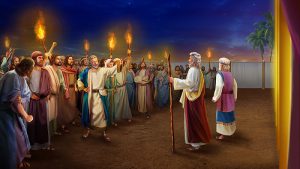
“Korah” refers to the man of the same name who was responsible for mounting a rebellion against Moshe. There are many unique aspects to this act of rebellion, such as it being led by a Levite and a confederation of other leaders, and that Moshe and Aaron are on the same side against them. We also have touches of foreshadowing of Eliyahu’s later contest against the prophets of Baal. The results of this rebellion are among the most graphic of disasters depicted in Tanakh. Because the very fabric of the priesthood was threatened, the stakes for the right side surviving …
- Shelach Lecha (Audio Portion)

“Shelach Lecha” means “send out for yourself”, referring to the spies that Moshe will send into Canaan to do a little “reconnaissance” on the strategic strengths of the various peoples living in Canaan. When the spies let their fear get the better of them and bring back an evil report, Abba YHWH officially enacts punishment that they will spend an additional 40 years wandering in the wilderness, or a total of 42 years from the time they left Egypt. However Caleb and Joshua prove themselves to be the voices of righteousness and will not give into fear.
Then, for the second … - Behalotekha (Audio Portion)

“BeHalotekha” means “when you elevate” as in “when you lift up the lamps.” Aaron is commanded to light the lamps of the menorah and the tribe of Levi is commanded to serve the sanctuary. This is also when the institution of the 2nd Pesach is established and when the Israelites grumble over only having manna to eat as well as showing rebellion against Moshe from his own siblings!
- Naso (Audio Portion)

“Naso” means “take,” as in “you will take an accounting of Israel” or a census. This portion begins with the census on the Gershonites and details all their prescribed duties in ministering to the Tabernacle. This is followed by the bitter waters test for an adulterous woman in Numbers 5 and other instructions for the sons of Aaron, culminating with the Blessing of the Priests in chapter 6. The 7th and last chapter in the portion details the contributions for the Tabernacle made by each tribal leader.
- Bamidbar (Audio Portion)

“BaMidbar” means “in the wilderness” and it begins with a census being taken of the nation, particularly of men 20 years and older who are able to serve in combat. The total comes to 603,550 excepting Levites who cannot be counted for this purpose. After this more details are given for how the Levites are to maintain the Tabernacle as well as their own purity.
- Be’Chukkotai (Audio Portion)

“BeChukkotai” means “by/through My statutes,” referring to Abba YHWH’s judgments being “walked in” or followed. There is a distinction made between “laws” and “statutes” and “commandments” which we will look into later. This portion though goes beyond just listing a bunch of rules; rather it deals with the rewards for obedience and punishments for disobedience. Most striking of these enactments is the prediction in 26:34-35, where Israel is warned they will be vomited out of the land if they fail to keep the Land Sabbath. The 27th chapter has extensive details on the monetary values of making an oath of …
- BaHar (Audio Portion)

“BaHar” means at the mountain, from which Abba YHWH gives this series of instructions. It concerns itself with the intricate Jubilee and Land Sabbath rules, which I will be discussing from Torah and giving my take on them in the Eternal Torah Calendar system.
- Emor (Audio Portion)

“Emor” means “he said” and it is heavily concerned with purity regulations, but it then shifts into a bigger picture with restoring and re stating the sacred year. Abba YHWH does this to show the Israelites to know they renew their covenant by following His instructions, so He repeats these rules to reassure Israel their covenant continues.
- Aharei Mot-Kedoshim (Audio Portion)

“Aharei Mot” means “after the death,” referring to the demise of Aaron’s sons Nadab and Abihu who offered fire in a way not sanctioned by Abba YHWH. The portion begins with the purification measures that Aaron and his remaining sons need to go through to rectify the evil that was done in Abba YHWH’s sight. Once done, additional purity regulations are given on how native Israelites are to slaughter and handle blood. Abba YHWH then opens the last chapter in this portion by reminding Israel that they are not to do the practices of the peoples either from where they …
- Tazria-Metzora (Audio Portion)

Tazria means “to bring seed, give birth.” It begins with the “niddah” rules, or how a woman is unclean for a certain period after giving birth. The rest of the portion then deals with how lepers are to be isolated and ultimately pronounced clean by the priests before being allowed to rejoin Israel.
“Metzora” or more precisely “Ha Metzora” means “The Leper,” and the portion concerns primarily how a leper gets pronounced clean by the priests, how he demonstrates he has been cleansed from the disease. The previous Torah portion (Tazria) concerned states of impurity and isolation for women who have … - 2021 Pesach Special (Audio Portion)

From deep associations with Noah’s Flood, Abraham and Lot to its observance in Israel waxing and waning for centuries on end, no Great Feast has quite the range and biblical impact as Passover and the Feast of Unleavened Bread and for Moshe personally, no other feast is more inextricably tied to his own triumphs and tragedies as he struggles to lead his people out of Egypt. While wicked rulers tried to make it extinct, it continuously is established a re-established by David, Hezekiah, Josiah and Nehemiah, all before being given the ultimate significance as the time of the crucifixion and …
- Shemini (Audio Portion)

Shemini means “on the 8th day” deals with the end of the priests’ consecration period. After this, they can then make expiation for all of Israel. Unfortunately however, two of Aaron’s sons pay the ultimate price for not ministering properly to the people. The portion then ends with the “kosher list” of what can and cannot be eaten, a perfect segue into our Renewed Covenant reading which also discusses kosher food.
- Tzav (Audio Portion)

Tzav means “command” as in commanding the sons of Aaron. It is another form of the same root we saw in an earlier parsha “tetzaveh” or “you will command/charge.” This time the focus of the portion is on the priestly responsibilities in preparing sacrifices.
- Vayikra (Audio Portion)

“Vayikra” means “and he called” and seems focused on the details about the various offerings and sacrifices that are needed for and by the priests of Aaron. I say “seems focused” because there are a lot of deep spiritual realities laying beneath the surface when we delve into the meanings of these rituals.
- Vayachel-Pekudei (Audio Portion)

“Vayachel” means “and he assembled”. The verb is derived from KAHAL, Hebrew for “assembly, congregation”. After a brief sermon on the importance of Shabbat, Moshe then gets the Israelites to work on the manifold details of building the Tabernacle and related furniture and objects.
“Pekudei” means “these are the records/expenses” and the portion opens with giving the pricing values for the materials that will be used in the Tabernacle. Many exacting physical (and spiritual) details are given for all the wondrous objects and the Tabernacle. But after all these long lists (from this portion and the previous ones) we finally get … - Ki Tissa (Audio Portion)

“Ki-Tissa” means “when you take,” referring to what Israel is to do when it takes a census of all the people. Most censuses in the ancient world are used for the purposes of taxation. This census is no different, except the “tax” is not for an emperor, but for YHWH’s Tabernacle. This “innocent” start though is misleading as it will then progress from those details to the construction of the Ark of the Covenant, only to culminate in disaster when Israel worships the golden calf. In a sense it parallels the pattern we saw with Yitro, except instead of preparation …
- Tetzaveh (Audio Portion)

“Tetzaveh” means “you will charge/command,” which opens with requirements for worship that are so important that failure to comply is simply not an option. If these needs are not met, nothing good will ever come about from that nation of Israel. We then get a lot of details about the designs of the priestly garments (ch. 28) and how the priests themselves are to be consecrated (ch. 29). The remaining 11 lines in ch. 30 concern instructions for building the altar.
- Terumah (Audio Portion)

Terumah means “the contributions” concerns a list of the offerings Israel gives to help build the Tabernacle in the wilderness as well as detailed instructions for building the Ark of the Covenant and other “divine furniture.”
- Mishpatim (Audio Portion)

“The Judgments” concerns a list of rules and regulations that Abba YHWH is giving to Israel. Generally they involve practical examples from the root commands given at Sinai. However, there is much more going on here than a mere laundry list of obligations. Sandwiched between these rules are some of the most powerful insights that Abba YHWH has ever imparted to man. It’s as if we have to wade through the rules to get to the reward of these insights. Hey, that sounds a lot like life too!
- 2020 Hanukkah Special (Audio Portion)
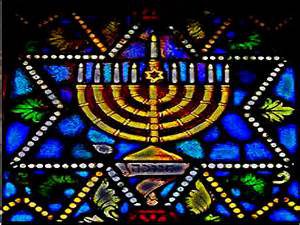
Literally from Genesis to Revelation, Hanukkah is an event prophesied thousands of years in advance and its influence extends thousands of years after it actually happened. Learn about the “Hidden Hanukkah” as well as go deep into the extant historical sources. Also enjoy a special update on how “the Star of Bethlehem” returns this year, on December 21st. Enjoy!
- Yitro (Audio Portion)

It is very significant that this parsha is named “Jethro” and not “The Ten Words” or Commandments that it contains. In a sense the advice that Jethro gives Moshe is just as important as the Ten Commandments because it shows YHWH’s plan. First Moshe needs to keep himself from getting exhausted. Then he needs to set the leaders of the nation of Israel on the right course, and encourage discussion between them and the people. And finally, the people need to understand that when Abba YHWH says “Don’t go there or you will die” that He means business! Only then, …
- Beshallach (Audio Portion)

“Be’shalach” means “let go,” and the portion begins with Pharaoh regretting his decision to free the Hebrews, so he musters his chariots in an attempt to bring them all back. Instead however Abba YHWH parts the waters of the Reed Sea and destroys Pharaoh’s army. But even as Israel rejoices, her trials are just beginning. After leaving camp from Elim on the 15th day (proving lunar sabbath wrong), the Israelites complain they don’t have enough meat, Abba YHWH sends a flock of quail and this is the first appearance of the mysterious Manna bread. The portion ends with a key …
- Bo (Audio Portion)

“Bo” means “go,” and that’s exactly what the Israelites do! After the last three plagues of locusts, darkness and killing the first born of Egypt do their damage, Pharaoh at last relents and lets Israel go. In the stunning aftermath of these events, the Pesach meal is instituted as an eternal memorial.
Enjoy this song about the prophet Jeremiah, sung to the tune of the Jim Croce song “Operator.” - Va’Era (Audio Portion)

Va’Era means “and I appeared,” as in Abba YHWH explaining that He appeared to Abraham, Isaac and Jacob and this thought of course follows from His introduction in Shemot that Moshe is a descendant of these people, “I am the El of your fathers…”.
After the initial “Bricks Without Straw” setback which happened last week, Moshe is strengthened to go back to Pharaoh though neither he nor his own people seem willing to do the right thing. Now also the “warning period” is over and Abba YHWH prepares to begin the real battle. After the signs of the serpent and the … - Shemot (Audio Portion)

Shemot means “the names,” and it is almost impossible to do justice in a few lines to such a majestic portion. We begin with the set-up of “the Pharaoh who did not know Joseph” and who therefore enslaves the Israelites (probably Ahmose I). Despite an edict to kill all Hebrew male infants, Moshe escapes and is adopted by the Pharaoh’s daughter called “Bithia” by the rabbis, “Thermuthis” by Josephus or “Tarmuth” by the Talmud. Moshe is raised as a Prince of Egypt until he kills an overseer for beating a Hebrew slave. Then he flees to Midian and is given …
- Vayechi (Audio Portion)

Vayechi means “and he lived,” referring to the 17 years Ya’akov would spend in Egypt before dying. The portion begins with Jacob making final arrangements to be buried in Canaan once he dies. Ironically the portion ends with Joseph making those same arrangements, but deferring final relocation until the Exodus. It seems that Joseph’s final vision then was his foretelling the time of Moshe. In between these events, Joseph’s sons Ephraim and Manasseh are introduced to Jacob and in a very ironic twist Jacob does intentionally the same thing his father Isaac was deceived into doing by blessing the younger …
- Vayigash (Audio Portion)

Vayigash means “and he approached,” referring to Judah approaching Joseph and pleading with him to return Benjamin. After this plea Joseph reveals his true identity and begins reconciling with his brothers. The portion ends with Joseph sending his brothers to fetch Jacob into Egypt and setting up the main foundation pieces for what will become the Exodus.
- Mikkets (Audio Portion)

Mikkets means “at the end” as in at the end of two years since Joseph interpreted the dreams of the baker and wine taster, and about 3 and half years for the total time of Joseph’s confinement. When Pharaoh has bad dreams and can’t get any of his seers to interpret them, the wine taster remembers Joseph and tells Pharaoh he can help. After Joseph correctly interprets the dream, he is quickly elevated to the second in command, given an Egyptian priestess for wife and moves forward with his plan for storing grain during the years of plenty. The rest …
- Vayeshev (Audio Portion)

Vayeshev means “and he dwelled.” This portion opens with the amazing story of Joseph, starting with his being sold into slavery to Midianite traders who in turn sell him in Egypt. The parsha then interrupts the Joseph story with the account of Judah and Tamar, but then resumes talking about Joseph first being tempted by his master’s wife only to have his abstinence backfire and land him in prison. Once there, Joseph’s intellect gets him noticed and he makes prophecies that come true for two prisoners, the baker and the wine taster. The baker is killed but the wine taster …
- Vayishlach (Audio Portion)

Vayishlach means “and he sent” and once again the ‘he’ is Jacob sending messengers ahead with gifts in an attempt to reconcile with Esau, and what follows is for me, bar none, the greatest apology EVER given in Scripture. After that we get the tragic story of Dinah and Shechem where he rapes her and, even though he later wishes to make it right by marrying her, the sons of Israel exact revenge anyway. This is followed by a rather unique wrestling match—in this corner, the cunning man of Canaan, Jacob! And in that corner-uh-Yeshua the Messiah! Guess who wins? …
- Vayetze (Audio Portion)

Vayetze means “and he departed” the ‘he’ being Jacob heading towards Haran. At Haran
Jacob has his famous vision of the heavenly ladder before proceeding to dwell with his
uncle Laban. This of course sets up the struggle with Jacob wanting Rachel but being
forced to marry Leah as he toils for twenty years. After finally escaping, Jacob finds
himself trapped between a deceptive uncle he left behind and a brother who publicly
swore to kill him coming towards him with hundreds of armed men. - Toldot (Audio Portion)

Toldot means “generations” or “family records,” referring to the lineage of Isaac. The troubled sibling rivalry of Jacob and Esau is the focus here. Jacob will eventually steal Esau’s birthright and blessing before running away. But as crafty as Jacob is he will find his uncle Laban even more deceitful and it is Laban who will outmaneuver Jacob for 20 years before Jacob gains advantage again. We also have the third occurrence—this time with Isaac and Abimelech II—of a wife (Rebecca this time) being passed off as a “sister” because a patriarch was afraid for his life. The portion ends …
- Chayei Sarah (Audio Portion)

Chayei Sarah means “life of Sarah” but ironically it begins with her death! The full meaning actually is “the Life of Sarah WAS.” In the wake of her death, Abraham must find an appropriate place to bury his wife. Ephron the Hittite first offers some land to Abraham for free, but Abraham insists on paying (actually OVERPAYING according to the rabbis) and signing a contract for the land to avoid future strife.
Chapter 24 then gives us the beautiful love story between Isaac and Rebecca. It becomes clear that while Isaac himself gets relatively little attention in Torah compared to his … - Vayera (Audio Portion)

Vayera means “and appeared,” referencing Abba YHWH appearing to Abraham with two other messengers. The trio brings news that Abraham and Sarah will have a son. Sarah, not believing Abba YHWH, laughs at hearing the pronouncement and then denies she did laugh. This is one reason why their son will be called Yitzkhak, “laughter.” Notable here also is that Abraham serves Abba YHWH and His two messengers milk and meat! After this the dark message—the destruction of Sodom and Gomorrah—is given. Since Abraham’s nephew Lot has settled there with his family, they must be evacuated from the coming disaster. At …
- Lech Lecha (Audio Portion)
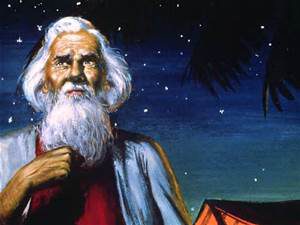
Lech Lecha means “get yourself out.” It concerns the command Abba YHWH gives Abram to into Canaan and has a lot of great “action” surrounding that main theme. First, move Abram has a bit of an adventure in Egypt when his wife acquired by Pharaoh because Abram said she was his sister! Then Abram had to do some intricate planning to get ahead of a potential family dispute between himself and his nephew Lot. After that a whole bunch of kings go to war around Abram and closer to home Abram is given the second most difficult test of his …
- Noach (Audio Portion)

Noach refers to Noah, a righteous man whose name means “comfort” or “peace.” Abba YHWH tells Noah He is about to flood all of humanity out of existence except for himself, his wife, their three sons and three daughters in law.
After the Flood, humanity tries to start over but there is still great evil about as Nimrod becomes a great and powerful leader and those (perhaps) under his influence attempt to build a tower to rival heaven, forcing Abba YHWH to confuse human language ever since. The genealogy brings us to the time of Abraham, thus setting up the covenant … - Bereshit (Audio Portion)

Bereshit means “in the beginning.” We start with the six days of creation with Abba YHWH resting on the Shabbat day and creating Adam and Eve. After their expulsion from paradise, Adam and Eve have two sons, Cain and Abel and the former kills the latter. Afterwards, Cain flees Abba YHWH’s presence, first to Nod and then he goes build a city. As the human race begins to spread throughout the earth, the first ten generations are recounted and the life of righteous Noah is introduced.
- 2020 Sukkot Special (Audio Portion)

The Feast of Ingathering…Remembering the years in the Wilderness…The Grape Harvest…The Birth of the Messiah, and possibly even his Second Coming area all tied up in Sukkot. Explore the deep connections that literally run from Genesis to Revelation. Sukkot is a feast like no other and the highlight of the entire year!
- Ha’azinu (Audio Portion)

Ha’azinu means “give your ears” or “listen.” It is the opening stanza of Moshe’s last song that he spoke of at the end of the previous portion. Although the language is poetic, the graphic imagery is meant for easy remembrance and its warnings are definitely LITERAL. There is no other poetry done as well in Tanakh except perhaps Job 38-42.
- 2020 Yom Kippur Special (Audio Portion)
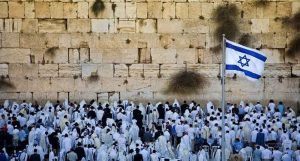
It’s the holiest day of the entire year and yet this is so much more than just fasting. It’s about reformation, repentance, and even the return of Yeshua the Messiah. Explore the connections across the full breadth of Scripture in this special nearly 2 1/2 hour program and have a good fast!
- Vayelech (Audio Portion)

Vayelech means, “and he went out/walked” referring of course to Moshe. The portion begins in a time of transition, where Joshua is brought forward as the next leader and final instructions to Israel are given. The portion ends with Moshe recording the words to a song, but those words are not given until the following portion, Ha’azinu.
- 2020 Yom Teruah Special (Audio Portion)

Enjoy the 2020 Yom Teruah Special, from the heart of teh Torah to the end of Revelation, Yom Teruah is a feast like no other. Our theme throughout: resetting cycles of time for new beginnings and setting up our prophetic future for Yeshua the Messiah’s return!
- Nitzavim (Audio Portion)
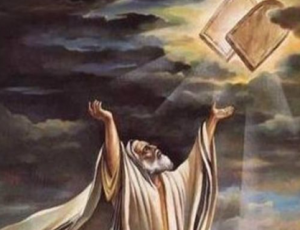
Nitzavim means “you stand” and it begins with more warnings for the price of disobedience. This is literally the beginning of the end of Israelite wandering and Moshe’s own life, so it is critical that every opportunity be taken to explain Israel’s responsibilities to them. This is an abnormally short portion.
- Ki Tavo (Audio Portion)

Ki Tavo means “when you enter” and begins with a variety of agricultural regulations that take effect once Israel has entered Canaan. Other regulations, such as that of tithing, are further instituted in the 26th chapter. 26 also contains a veiled rebuke from Moshe to the previous generation as he points out how good the land was, just as Abba YHWH commanded but this was not accepted as fact by Israel. As 27 opens, the Israelites will then hurl blessings from Mount Gerizim and curses from Ebal, as we spoke at length about earlier. The curses are, for the most …
- Ki Teze (Audio Portion)

Ki Teze means “when you go out” as in terms of when Israel confronts her enemies on the battle field. One main war regulation is given at the start, and that is what to do with a woman taken captive from the nations that a Jewish man wants to make a wife. From there other requirements about marriage under other circumstances follow that have nothing to do with war. Many other marital and purity regulations follow for the remainder of this portion.
- Shoftim (Audio Portion)

Shoftim means “judges” and Deuteronomy 16:18 begins with the command to appoint them. The Torah had suggested that these courts had to be established to resolve general disputes (Exodus 21:22, 22:8) but only here do we find the specific command to set these courts up in every city, probably because prior to this time they were not close to being settled in the land. Other warnings to kill idolaters in their midst follow along the lines of Deuteronomy 13 but lacking the provision that they do so even if predicted signs and wonders come true from the idolater’s mouth. Still …
- Re’eh (Audio Portion)
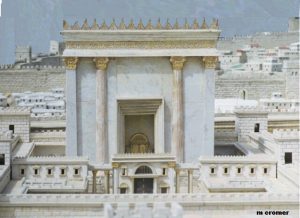
Re’eh means “see,” and it begins with that great summary of the covenant: I set aside two ways for you, blessing and cursing, life and death. Shortly afterwards, a number of regulations about the place for Abba YHWH’s Name—Jerusalem though no one other than Abba YHWH knows that yet—are given. Some kosher regulations are restated or clarified and the law of the shemittah is given and explained. The portion wraps up with a restatement of the Hebrew festivals.
- Ekev (Audio Portion)
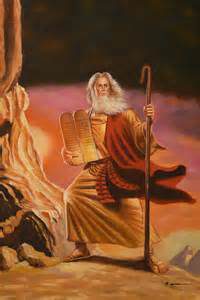
“Ekev” means “because” or “if only”. Following the theme of last week’s parsha of Va’etchanan, Moshe continues his urgent pleas to this current generation to realize that they are honor-bound to continue in the covenant originally granted to their fathers and that they, in a limited sense, share blame with their fathers for what went wrong.
However, the positive side is also great in that they, unlike their fathers can inherit the Promised Land “if only” they obey and repent!
Please Note: There is a very slight editing splice about 12 minutes in to Video #3. This was due to a source … - Va’etchanan (Audio Portion)

Va’etchanan means “and I pleaded” or “and I asked for favor/mercy”. This is Moshe pleading with Abba YHWH one last time to ask to be allowed to enter into the Promised Land. Abba YHWH though utterly refuses and says, “Speak to Me no more on this matter”! After an extensive prologue in chapter 4, the Ten Commandments are re-stated in chapter 5 and the foundational Shema prayer of course is the highlight of the Tanakh as well as chapter 6! The remainder of the portion is concerned with reinforcing obedience as the way to a better life.
- Devarim (Audio Portion)
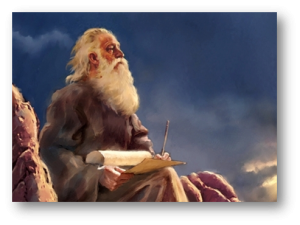
Devarim means “the words” and as the book opens we enter the last day of Moshe’s life. Moshe begins the book by recapping the details of the last 40 years. The portion ends with Moshe reminding Israel of the times that Abba YHWH fought for them. Now that the evil generation is gone, the time has come to strengthen their children by having them know that Abba YHWH is with them as they enter Canaan.
- Masei (Audiio Portion)

Masei means “the journeys,” and the entire 33rd chapter is devoted to the list of the 42 places the Israelites stopped at along the way to Canaan. The rest of the portion concerns detailed rules about what the land’s borders will be, which tribe gets what and general rules on inheritance. There is a sequel at the end of the portion where the daughters of Tzelophehad are told they must marry within their tribe to inherit. If they marry outside they do not get their inheritance.
- Matot

Matot means “the tribes”, but also has very interesting secondary meanings of “staff, scepter, rod, branch,” all of which seem relevant here. The portion opens with a discussion on the need to fulfill valid oaths to Abba YHWH to the letter-valid meaning that the oath is not contradictory to Abba YHWH’s laws or pronouncements. Various examples and applications of this principle follow.
Then it is time to actually go to war against Midian. It is interesting that the previous portion had Israel get ready for this mentally, by totally changing their attitude and then Abba YHWH says, “Now is the time.” … - Pinchus (Audio Portion)

Pinchus refers to the man whose righteous example of purging evil from Israel’s ranks moved Abba YHWH to stop a plague that would have otherwise destroyed all Israel. More than that, the portion starts with Pinchus getting a particularly high honor from Abba YHWH, the covenant of peace that rests on him alone and ensures his progeny the high priesthood.
But with the population of Israel decimated by the plague, a new census had to be done in chapter 26. When that counting was concluded, Moshe is then given a very interesting issue to deliberate on: Should women be allowed to … - Balak (Audio Portion)

Balak refers to the man, Balak of Zippor, who was the king of Moab and a dedicated enemy of Israel. When Balak then hears of a man named Balaam who can predict the future and cast curses, he hires him to curse Israel. However, Balaam can truly hear Abba YHWH’s Will and Abba YHWH tells him plainly that he can’t curse Israel. On three occasions the king of Moab wants a curse against Israel but only gets blessings for them instead. And then Balaam gives a fourth blessing on his way out—one for the proverbial road as it were.
Ironically also, … - Chukkat (Audio Portion)

Chukkat” means “statute” and the portion opens with the requirements of the famous red heifer, that perfect red young cow that is so sacred, nothing else will do to inaugurate the entire sacrificial infrastructure. Not surprisingly then, the requirements for finding and then preparing for such a massively important sacrifice are detailed and intricate. Other purity laws follow after which we are confronted with the sad news of Moshe’s sister Miriam dying. Ironically, instead of Moshe getting compassion from the Israelites on this occasion they immediately rise up in rebellion against him once more!
In response to this latest threat, Abba … - Korah (Audio Portion)

“Korah” refers to the man of the same name who was responsible for mounting a rebellion against Moshe. There are many unique aspects to this act of rebellion, such as it being led by a Levite and a confederation of other leaders and that Moshe and Aaron are on the same side against them. We also have touches of foreshadowing of Eliyahu’s later contest against the prophets of Baal. The results of this rebellion are among the most graphic of disasters depicted in Tanakh. Because the very fabric of the priesthood was threatened, the stakes for the right side surviving …
- Shelach Lecha (Audio Portion)

“Shelach Lecha” means “send out for yourself”, referring to the spies that Moshe will send into Canaan to do a little “reconnaissance” on the strategic strengths of the various peoples living in Canaan. When the spies let their fear get the better of them and bring back an evil report, Abba YHWH officially enacts punishment that they will spend an additional 40 years wandering in the wilderness, or a total of 42 years from the time they left Egypt. However Caleb and Joshua prove themselves to be the voices of righteousness and will not give into fear.
Then, for the second … - Naso (Audio Portion)

“Naso” means “take”, as in “you will take an accounting of Israel” or a census. This portion begins with the census on the Gershonites and details all their prescribed duties in ministering to the Tabernacle. This is followed by the bitter waters test for an adulterous woman in Numbers 5 and other instructions for the sons of Aaron, culminating with the Blessing of the Priests in chapter 6. The 7th and last chapter in the portion details the contributions for the Tabernacle made by each tribal leader.
- Bamidbar (Audio Portion)

“BaMidbar” means “in the wilderness” and it begins with a census being taken of the nation, particularly of men 20 years and older who are able to serve in combat. The total comes to 603,550 excepting Levites who cannot be counted for this purpose. After this more details are given for how the Levites are to maintain the Tabernacle as well as their own purity.
- Be’Chukkotai (Audio Portion)

“BeChukkotai” means “by/through My statutes”, referring to Abba YHWH’s judgments being “walked in” or followed. There is a distinction made between “laws” and “statutes” and “commandments” which we will look into later. This portion though goes beyond just listing a bunch of rules; rather it deals with the rewards for obedience and punishments for disobedience. Most striking of these enactments is the prediction in 26:34-35, where Israel is warned they will be vomited out of the land if they fail to keep the Land Sabbath. The 27th chapter has extensive details on the monetary values of making an oath of …
- BaHar (Audio Portion)

“BaHar” means at the mountain, from which Abba YHWH gives this series of instructions. It concerns itself with the intricate Jubilee and Land Sabbath rules, which I will be discussing from Torah and giving my take on them in the Eternal Torah Calendar system.
- Emor (Audio Portion)

“Emor” means “he said” and it is heavily concerned with purity regulations, but it then shifts into a bigger picture with restoring and re stating the sacred year. Abba YHWH does this to show the Israelites to know they renew their covenant by following His instructions, so He repeats these rules to reassure Israel their covenant continues.
- Aharei Mot-Kedoshim (Audio Portion)

“Aharei Mot” means “after the death”, referring to the demise of Aaron’s sons Nadab and Abihu who offered fire in a way not sanctioned by Abba YHWH. The portion begins with the purification measures that Aaron and his remaining sons need to go through to rectify the evil that was done in Abba YHWH’s sight. Once done, additional purity regulations are given on how native Israelites are to slaughter and handle blood. Abba YHWH then opens the last chapter in this portion by reminding Israel that they are not to do the practices of the peoples either from where they …
- Metzora (Audio Portion)

“Metzora” or more precisely “Ha Metzora,” means “The Leper,” and the portion concerns primarily how a leper gets pronounced clean by the priests, how he demonstrates he has been cleansed from the disease. The previous Torah portion (Tazria) concerned states of impurity and isolation for women who have just given birth and lepers. This portion deals with how to get the lepers clean again. It then takes an interesting turn to discuss what happens when a whole house becomes unclean before ending with other purity rules for men and women.
- Tazria (Audio Portion)

Tazria means “to bring seed, give birth.” It begins with the “niddah” rules, or how a woman is unclean for a certain period after giving birth. The rest of the portion then deals with how lepers are to be isolated and ultimately pronounced clean by the priests before being allowed to rejoin Israel.
- Shemini (Audio Portion)
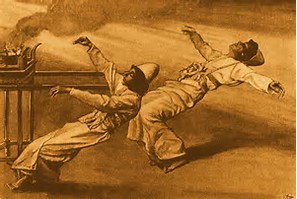
Shemini means “on the 8th day” deals with the end of the priests’ consecration period. After this, they can then make expiation for all of Israel. Unfortunately however, two of Aaron’s sons pay the ultimate price for not ministering properly to the people. The portion then ends with the “kosher list” of what can and cannot be eaten, a perfect segue into our Renewed Covenant reading which also discusses kosher food.
- Tzav (Audio Portion)

Tzav means “command” as in commanding the sons of Aaron. It is another form of the same root we saw in an earlier parsha “tetzaveh” or “you will command/charge”. This time the focus of the portion is on the priestly responsibilities in preparing sacrifices.
- Vayikra and 2020 Purim Special (Audio Portion)
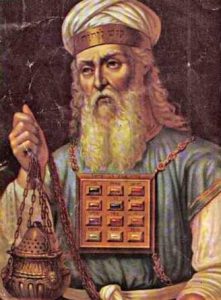
“Vayikra” means “and he called” and seems focused on the details about the various offerings and sacrifices that are needed for and by the priests of Aaron. I say “seems focused” because there are a lot of deep spiritual realities laying beneath the surface when we delve into the meanings of these rituals. The 2020 Purim Special follows Video #3! Enjoy!
- Pekudei (Audio Portion)
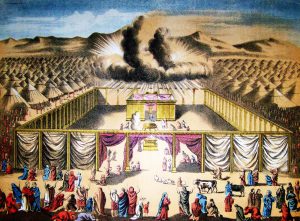
“Pekudei” means “these are the records/expenses” and the portion opens with giving the pricing values for the materials that will be used in the Tabernacle. Many exacting physical (and spiritual) details are given for all the wondrous objects and the Tabernacle. But after all these long lists (from this portion and the previous ones) we finally get to the “payoff” in lovely chapter 40. It is in chapter 40—the last of Exodus—that time literally begins again as the priests begin their official service for Israel.
- Vayachel (Audio Portion)
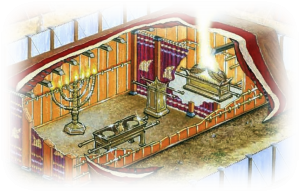
“Vayachel” means “and he assembled”. The verb is derived from KAHAL, Hebrew for “assembly, congregation”. After a brief sermon on the importance of Shabbat, Moshe then gets the Israelites to work on the manifold details of building the Tabernacle and related furniture and objects.
- Ki Tissa (Audio Portion)

“Ki-Tissa” means “you will take”, referring to what Israel is to do when it takes a census of all the people. Most censuses in the ancient world are used for the purposes of taxation. This census is no different, except the “tax” is not for an emperor, but for YHWH’s Tabernacle. This “innocent” start though is misleading as it will then progress from those details to the construction of the Ark of the Covenant, only to culminate in disaster when Israel worships the golden calf. In a sense it parallels the pattern we saw with Yitro, except instead of preparation …
- Tetzaveh (Audio Portion)
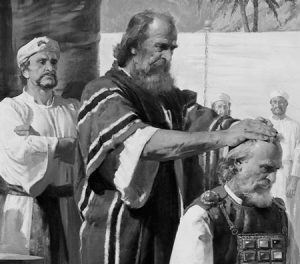
“Tetzaveh” means “you will charge/command,” which opens with requirements for worship that are so important that failure to comply is simply not an option. If these needs are not met, nothing good will ever come about from that nation of Israel. We then get a lot of details about the designs of the priestly garments (ch. 28) and how the priests themselves are to be consecrated (ch. 29). The remaining 11 lines in ch. 30 concern instructions for building the altar.
- Terumah (Audio Portion)

Terumah means “the contributions” concerns a list of the offerings Israel gives to help build the Tabernacle in the wilderness as well as detailed instructions for building the Ark of the Covenant and other “divine furniture”.
- Mishpatim (Audio Portion)

“The Judgments” concerns a list of rules and regulations that Abba YHWH is giving to Israel. Generally they involve practical examples from the root commands given at Sinai. However, there is much more going on here than a mere laundry list of obligations. Sandwiched between these rules are some of the most powerful insights that Abba YHWH has ever imparted to man. It’s as if we have to wade through the rules to get to the reward of these insights. Hey, that sounds a lot like life too!
- Yitro (Audio Portion)

It is very significant that this parsha is named “Jethro” and not “The Ten Words” or Commandments that it contains. In a sense the advice that Jethro gives Moshe is just as important as the Ten Commandments because it shows YHWH’s plan.
First Moshe needs to keep himself from getting exhausted. Then he needs to set the leaders of the nation of Israel on the right course, and encourage discussion between them and the people. And finally, the people need to understand that when Abba YHWH says “Don’t go there or you will die” that He means business! Only then, … - Be’shalach (Audio Portion)

“Be’shalach” means “let go”, and the portion begins with Pharaoh regretting his decision to free the Hebrews, so he musters his chariots in an attempt to bring them all back. Instead however Abba YHWH parts the waters of the Reed Sea and destroys Pharaoh’s army. But even as Israel rejoices, her trials are just beginning. After leaving camp from Elim on the 15th day (proving lunar sabbath wrong), the Israelites complain they don’t have enough meat, Abba YHWH sends a flock of quail and this is the first appearance of the mysterious Manna bread. The portion ends with a …
- Bo (Audio Portion)

“Bo” means “go,” and that’s exactly what the Israelites do! After the last three plagues of locusts, darkness and killing the first born of Egypt do their damage; Pharaoh at last relents and lets Israel go. In the stunning aftermath of these events, the Pesach meal is instituted as an eternal memorial.
- Va’Era (Audio Portion)

Va’Era means “and I appeared”, as in Abba YHWH explaining that He appeared to Abraham, Isaac and Jacob and this thought of course follows from His introduction in Shemot that Moshe is a descendant of these people, “I am the El of your fathers…”. After the initial “Bricks Without Straw” setback which happened last week, Moshe is strengthened to go back to Pharaoh though neither he nor his own people seem willing to do the right thing. Now also the “warning period” is over and Abba YHWH prepares to begin the real battle. After the signs …
- Shemot (Audio Portion)
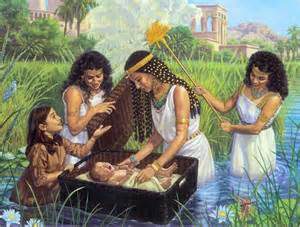
One epic ends and another begins. Joseph and all the other sons of Jacob are dead. And now, their descendants are in bondage waiting for a deliverer. Enter Moshe. Born a prince of Egypt, explore the real life Egyptian history behind the Torah account. Find out who the main people in Moshe’s life really were and how archaeology sheds light on the world they knew. This is just about as exciting as any parsha gets and it is packed with extras…enjoy!
Special Bonus My Exodus parody song, “My Name is Yahweh.” This one has been one of my top favorites from … - Vayechi (Audio Portion)

Vayechi means “and he lived”, referring to the 17 years Ya’akov would spend in Egypt before dying. The portion begins with Jacob making final arrangements to be buried in Canaan once he dies. Ironically the portion ends with Joseph making those same arrangements, but deferring final relocation until the Exodus. It seems that Joseph’s final vision then was his foretelling the time of Moshe. In between these events, Joseph’s sons Ephraim and Manasseh are introduced to Jacob and in a very ironic twist Jacob does intentionally the same thing his father Isaac was deceived into doing by blessing the younger …
- Vayigash (Audio Portion)

Vayigash means “and he approached”, referring to Judah approaching Joseph and pleading with him to return Benjamin. After this plea Joseph reveals his true identity and begins reconciling with his brothers. The portion ends with Joseph sending his brothers to fetch Jacob into Egypt and setting up the main foundation pieces for what will become the Exodus.
- Mikkets (Audio Portion)
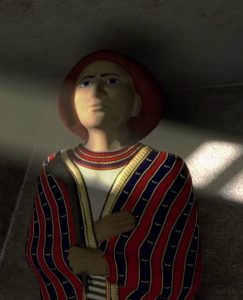
Mikkets means “at the end” as in at the end of two years of Joseph’s confinement. When Pharaoh has bad dreams and can’t get any of his seers to interpret them, the wine taster remembers Joseph and tells Pharaoh he can help. After Joseph correctly interprets the dream, he is quickly elevated to the second in command, given an Egyptian priestess for wife and moves forward with his plan for storing grain during the years of plenty. The rest of the portion details the intricate series of comical pranks Joseph plays on his brothers—but to those brothers it is a …
- 2019 Hanukkah Special (Audio Portion)

Explore the fascinating prophetic roots of Hanukkah, literally from Genesis to Revelation! Enjoy!
- Vayeshev and 2019 Hanukkah Special (Audio Portion)

Vayeshev means “and he dwelled.” This portion opens with the amazing story of Joseph, starting with his being sold into slavery to Midianite traders who in turn sell him in Egypt. The parsha then interrupts the Joseph story with the account of Judah and Tamar, but then resumes talking about Joseph first being tempted by his master’s wife only to have his abstinence backfire and land him in prison. Once there, Joseph’s intellect gets him noticed and he makes prophecies that come true for two prisoners, the baker and the wine taster. The baker is killed but the wine taster …
- Vayishlach (Audio Portion)

Vayishlach means “and he sent” and once again the ‘he’ is Jacob sending messengers ahead with gifts in an attempt to reconcile with Esau, and what follows is, bar none, the greatest apology EVER given in Scripture. After that we get the tragic story of Dinah and Shechem where he rapes her and, even though he later wishes to make it right by marrying her, the sons of Israel exact revenge anyway. This is followed by a rather unique wrestling match—in this corner, the cunning man of Canaan, Jacob! And in that corner-uh-Y’shua the Messiah! Guess who wins? …
- Vayetze (Audio Portion)

Vayetze means “and he departed” the ‘he’ being Jacob heading towards Haran. At Haran Jacob has his famous vision of the heavenly ladder before proceeding to dwell with his uncle Laban. This of course sets up the struggle with Jacob wanting Rachel but being forced to marry Leah as he toils for twenty years. After finally escaping, Jacob finds himself trapped between a deceptive uncle he left behind and a brother who publicly swore to kill him coming towards him with hundreds of armed men.
- Toldot (Audio Portion)

Toldot means “generations” or “family records”, referring to the lineage of Isaac. The troubled sibling rivalry of Jacob and Esau is the focus here. Jacob will eventually steal Esau’s birthright and blessing before running away. But as crafty as Jacob is he will find his uncle Laban even more deceitful and it is Laban who will outmaneuver Jacob for 20 years before Jacob gains advantage again. We also have the third occurrence—this time with Isaac and Abimelech II—of a wife (Rebecca this time) being passed off as a “sister” because a patriarch was afraid for his life. The portion ends …
- Chayei Sarah (Audio Portion)

Chayei Sarah means “life of Sarah” but ironically it begins with her death! The full meaning actually is “the Life of Sarah WAS”. In the wake of her death, Abraham must find an appropriate place to bury his wife. Ephron the Hittite first offers some land to Abraham for free, but Abraham insists on paying (actually OVERPAYING according to the rabbis) and signing a contract for the land to avoid future strife. Chapter 24 then gives us the beautiful love story between Isaac and Rebecca. It becomes clear that while Isaac himself gets relatively little attention in Torah compared …
- Vayera (Audio Portion)

Vayera means “and appeared,” referencing Abba YHWH appearing to Abraham with two other messengers. The trio brings news that Abraham and Sarah will have a son. Sarah, not believing Abba YHWH, laughs at hearing the pronouncement and then denies she did laugh. This is one reason why their son will be called Yitzkhak, “laughter”. Notable here also is that Abraham serves Abba YHWH and His two messengers milk and meat!
After this the dark message—the destruction of Sodom and Gomorrah—is given. Since Abraham’s nephew Lot has settled there with his family, they must be evacuated from … - Lech Lecha (Audio Portion)
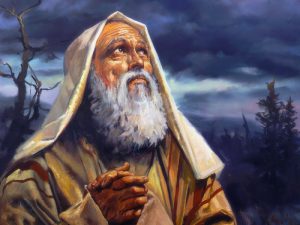
Lech Lecha means “get yourself out.” It concerns the command Abba YHWH gives Abram to go into Canaan and has a lot of great “action” surrounding that main theme. First, move Abram has a bit of an adventure in Egypt when his wife acquired by Pharaoh because Abram said she was his sister! Then Abram had to do some intricate planning to get ahead of a potential family dispute between himself and his nephew Lot. After that a whole bunch of kings go to war around Abram and closer to home Abram is given the second most difficult …
- Noach (Audio Portion)

Noach refers to Noah, a righteous man whose name means “comfort” or “peace”. Abba YHWH tells Noah He is about to flood all of humanity out of existence except for himself, his wife, their three sons and three daughters in law. After the Flood, humanity tries to start over but there is still great evil about as Nimrod becomes a great and powerful leader and those (perhaps) under his influence attempt to build a tower to rival heaven, forcing Abba YHWH to confuse human language ever since. The genealogy brings us to the time of Abraham, thus setting up the …
- Bereshit (Audio Portion)

Bereshit means “in the beginning” of course. We start with the six days of creation with Abba YHWH resting on the Shabbat day. After their expulsion from paradise, Adam and Eve have two sons, Cain and Abel and of course the former kills the latter. Afterwards, Cain flees Abba YHWH’s presence, first to Nod and then he goes build a city. As the human race begins to spread throughout the earth, the first ten generations are recounted and the life of righteous Noah is introduced.
- Ha’azinu Ve-Zot Ha-Baracha (Audio Portion)

FROM OUR SUKKAH TO YOURS–CHAG SAMEYACH!
It’s the last two parshas of the year before recycling back to Genesis, but this last installment is packed and getting us ready to recycle once more. We have special Sukkot readings and features that keep the feast going a little longer and other features that set us up to begin the Torah all over again, Enjoy!
